#reverse 1999 knows how to world build
Explore tagged Tumblr posts
Text


76 notes
·
View notes
Text
Angst Prompts Based Off of the Last 10 Video Games I've Played
"Leave me!" Character A pushed Character B towards the path of freedom, drawing themselves backwards into certain danger. "You have to go now. Let me play distraction- I'm already injured." - Dead By Daylight
Character A threw themselves against the door, slamming it shut behind them. They collapsed into a curled ball at the base of the door, soon burying their face into their hands, trying to smother out the building sob. How could they fail to safe Character B? - Rainbow Six Siege
Space, nothingness, and a barrage of endless stars. This was Character's new life. They were surrounded by an abyss of outerspace, slowly watching their oxygen tank deplete. They had a whole lot to think about. A whole new world of drifting about aimlessly until the end of days. - No Man's Sky
The motherly creature didn't hesitate to pry the child from the sludge of war, brushing at the built up dirt on their face. The child buried their face into the creature's form. They begun to beg that the creature must also save the soldier. - Sky: Children of the Light
"I'm sorry." The voice seemed innocently sad, "I don't remember you." - Reverse 1999
The exhausted figure crawled into the safe haven, drawing a splotchy trail of blood. They rolled over onto to their back. All the air escaped their lungs as the extent of their wounds ran out of adrenaline. They didn't know the place they ended up. They just knew it was safe. It didn't matter whether or not it was even empty, and it wasn't. They realized that as a shadow casted over them. - Project Zomboid
"Hero- You're fired. No ifs, ands, or buts. Get out of my sight." - Have A Nice Death
"You might think I'm crazy, but I swear to god there's someone after me. I can't shake the feeling of being watched. What if... What if it's them again?" - Muse Dash
"You have to do." Character A hissed through gritted teeth, unveiling their bloodied bite from their upper arm. They continued, "You have to shoot me Character B."
"But what if I can find a cure?"
"You have better luck finding a helicopter." - State of Decay 2
Character A promised Character B that once they remove their blindfold they could finally see again. - Cult of the Lamb
28 notes
·
View notes
Text
Appendix A: An Imagined and Incomplete Conversation about “Consciousness” and “AI,” Across Time
Every so often, I think about the fact of one of the best things my advisor and committee members let me write and include in my actual doctoral dissertation, and I smile a bit, and since I keep wanting to share it out into the world, I figured I should put it somewhere more accessible.
So with all of that said, we now rejoin An Imagined and Incomplete Conversation about “Consciousness” and “AI,” Across Time, already (still, seemingly unendingly) in progress:
René Descartes (1637): The physical and the mental have nothing to do with each other. Mind/soul is the only real part of a person.
Norbert Wiener (1948): I don’t know about that “only real part” business, but the mind is absolutely the seat of the command and control architecture of information and the ability to reflexively reverse entropy based on context, and input/output feedback loops.
Alan Turing (1952): Huh. I wonder if what computing machines do can reasonably be considered thinking?
Wiener: I dunno about “thinking,” but if you mean “pockets of decreasing entropy in a framework in which the larger mass of entropy tends to increase,” then oh for sure, dude.
John Von Neumann (1958): Wow things sure are changing fast in science and technology; we should maybe slow down and think about this before that change hits a point beyond our ability to meaningfully direct and shape it— a singularity, if you will.
Clynes & Klines (1960): You know, it’s funny you should mention how fast things are changing because one day we’re gonna be able to have automatic tech in our bodies that lets us pump ourselves full of chemicals to deal with the rigors of space; btw, have we told you about this new thing we’re working on called “antidepressants?”
Gordon Moore (1965): Right now an integrated circuit has 64 transistors, and they keep getting smaller, so if things keep going the way they’re going, in ten years they’ll have 65 THOUSAND. :-O
Donna Haraway (1991): We’re all already cyborgs bound up in assemblages of the social, biological, and techonological, in relational reinforcing systems with each other. Also do you like dogs?
Ray Kurzweil (1999): Holy Shit, did you hear that?! Because of the pace of technological change, we’re going to have a singularity where digital electronics will be indistinguishable from the very fabric of reality! They’ll be part of our bodies! Our minds will be digitally uploaded immortal cyborg AI Gods!
Tech Bros: Wow, so true, dude; that makes a lot of sense when you think about it; I mean maybe not “Gods” so much as “artificial super intelligences,” but yeah.
90’s TechnoPagans: I mean… Yeah? It’s all just a recapitulation of The Art in multiple technoscientific forms across time. I mean (*takes another hit of salvia*) if you think about the timeless nature of multidimensional spiritual architectures, we’re already—
DARPA: Wait, did that guy just say something about “Uploading” and “Cyborg/AI Gods?” We got anybody working on that?? Well GET TO IT!
Disabled People, Trans Folx, BIPOC Populations, Women: Wait, so our prosthetics, medications, and relational reciprocal entanglements with technosocial systems of this world in order to survive makes us cyborgs?! :-O
[Simultaneously:]
Kurzweil/90’s TechnoPagans/Tech Bros/DARPA: Not like that. Wiener/Clynes & Kline: Yes, exactly.
Haraway: I mean it’s really interesting to consider, right?
Tech Bros: Actually, if you think about the bidirectional nature of time, and the likelihood of simulationism, it’s almost certain that there’s already an Artificial Super Intelligence, and it HATES YOU; you should probably try to build it/never think about it, just in case.
90’s TechnoPagans: …That’s what we JUST SAID.
Philosophers of Religion (To Each Other): …Did they just Pascal’s Wager Anselm’s Ontological Argument, but computers?
Timnit Gebru and other “AI” Ethicists: Hey, y’all? There’s a LOT of really messed up stuff in these models you started building.
Disabled People, Trans Folx, BIPOC Populations, Women: Right?
Anthony Levandowski: I’m gonna make an AI god right now! And a CHURCH!
The General Public: Wait, do you people actually believe this?
Microsoft/Google/IBM/Facebook: …Which answer will make you give us more money?
Timnit Gebru and other “AI” Ethicists: …We’re pretty sure there might be some problems with the design architectures, too…
Some STS Theorists: Honestly this is all a little eugenics-y— like, both the technoscientific and the religious bits; have you all sought out any marginalized people who work on any of this stuff? Like, at all??
Disabled People, Trans Folx, BIPOC Populations, Women: Hahahahah! …Oh you’re serious?
Anthony Levandowski: Wait, no, nevermind about the church.
Some “AI” Engineers: I think the things we’re working on might be conscious, or even have souls.
“AI” Ethicists/Some STS Theorists: Anybody? These prejudices???
Wiener/Tech Bros/DARPA/Microsoft/Google/IBM/Facebook: “Souls?” Pfffft. Look at these whackjobs, over here. “Souls.” We’re talking about the technological singularity, mind uploading into an eternal digital universal superstructure, and the inevitability of timeless artificial super intelligences; who said anything about “Souls?”
René Descartes/90’s TechnoPagans/Philosophers of Religion/Some STS Theorists/Some “AI” Engineers: …
[Scene]
----------- ----------- ----------- -----------
Read Appendix A: An Imagined and Incomplete Conversation about “Consciousness” and “AI,” Across Time at A Future Worth Thinking About
and read more of this kind of thing at: Williams, Damien Patrick. Belief, Values, Bias, and Agency: Development of and Entanglement with "Artificial Intelligence." PhD diss., Virginia Tech, 2022. https://vtechworks.lib.vt.edu/handle/10919/111528.
#ableism#afrofuturism#alan turing#alison kafer#alterity#anselm's ontological argument for the existence of god#artificial intelligence#astrobiology#audio#autonomous created intelligence#autonomous generated intelligence#autonomously creative intelligence#bodies in space#bodyminds#communication#cybernetics#cyborg#cyborg anthropology#cyborg ecology#cyborgs#darpa#decolonization#decolonizing mars#digital#disability#disability studies#distributed machine consciousness#distributed networked intelligence#donna haraway#economics
18 notes
·
View notes
Text
File: Courage the Cowardly Dog S1 E4A
SCP#: AIB
Code Name: The Mattress Demon
Object Class: Safe
Special Containment Procedures: SCP-AIB has been placed at Site-AA within the anomalous furniture storage unit. SCP-AIB is regularly used in interview testing to find out more about the inner workings of Group of Interest: The Factory. During such testing a single D Class is to be escorted to the testing area with Foundation security guarding them. The D Class is to be wearing an explosive collar in case the situation becomes extreme or testing is declared over.
Description: SCP-AIB is a mattress that looks and feels extremely comfortable but is possessed by a demon and filled to the brim with TRE Radiation. This massive amount of TRE Radiation allows the demon to possess anyone who sleeps on the mattress and influence them to lay there forever to act as the demon’s vessel. From there they will torment and terrorize anyone who is near SCP-AIB. Testing has shown that SCP-AIB has no way of pursuing new victims if no one is around. Furthermore SCP-AIB normally relies on tormenting family members or friends of the victim so should it ever possess someone who is alone or has no connections SCP-AIB will have no one to torment. It is for this reason SCP-AIB is labeled as Object Class Safe.
SCP-AIB was discovered in 1999 when a truck carrying the logo of The Factory was driving out from the middle of the [data expunged] desert. Thankfully it was intercepted by a team form the Exorcist Corps of the Horizon Initiative. They claimed the truck was oddly driven by two deformed rats that were somehow able to stand on their hind feet. They killed the rats and tried to exorcize SCP-AIB though only succeeded in freeing a man who was possessed and then allowing him free. They unfortunately didn’t acquire any information about the man as their target was SCP-AIB though they did note he was extremely rude and ungrateful.
For years the Horizon Initiative tried to exorcize the SCP-AIB but had no success as the demon was able to use its vast amount of TRE Radiation to resist any exorcist ritual. Since no progress within the HI was made, it was decided to utilize Protocol “United Hands” and negotiated the surrender of SCP-AIB into Foundation custody. Thankfully the negotiations ended well, and the Horizon Initiative ended up not demanding anything in exchange, thus in 2004 SCP-AIB was finally in Foundation custody.
Testing had shown that the demon within SCP-AIB was aware of GoI: The Factory and had some promising knowledge on the subject. Please see Addendum X-62 for details.
***
Addendum X-62
The following is one of the interviews with SCP-AIB and Dr. Alvik after SCP-AIB has taken a D Class as a host to communicate. Dr. Alvik was specifically requested due to his status as an [data expunged] and his position within the Department of Universal Affairs.
***
Begin Recording
Dr. Alvik: Yo, can you hear me AIB?
SCP-AIB: I hear you mor… wait… not mortal… [data expunged]?
Dr. Alvik: I don’t associate with my father, so I don’t like that title.
SCP-AIB: Heh, guess that makes sense he has been losing influence since the world has gotten more… chaotic.
Dr. Alvik: Let’s focus on you, how do you know the Factory, how did you even come to become one of its products? How did they even sell you?
SCP-AIB: Hehehe… I possessed someone about… a while ago, don’t remember when and can’t be fucked to care.
Dr. Alvik: Fine, just continue.
SCP-AIB: Hm, I was just in the middle of being exorcised by those fucking priestess when a large metal building suddenly grew out of the ground and wretched everything.
Dr. Alvik: Wait? Priestess? As in a female priest?
SCP-AIB: Oh right, I think it was a world different from this one, one where christianity was still founded but declared females closer to God than males due to Adam taking the first bite of the forbidden fruit.
Dr. Alvik: Oh, so you're from another reality where the gender roles are reversed, that’s cool I guess. But what happened next and how did it lead to you ending up here?
SCP-AIB: After the metal building was done forming it started releasing this strange energy, I believe the humans call it radiation. Some people started melting, some died instantly, others mutated, as for my host they melted into the mattress both trapping me in but also allowing me to forever free from the grips of hell.
Dr. Alvik: Hm, then let me guess the freaks of the Factory started coming out and stealing stuff to make new anomalous items?
SCP-AIB: Pretty much, though the two rats found me personally and brought me to James Anderson. He liked me so much he decided to sell me personally for a test.
Dr. Alvik: A test?
SCP-AIB: The ones who purchased me, he specifically made advertisements for them wanting them to buy the mattress. To see what would happen, especially with the dog.
Dr. Alvik: The dog?
SCP-AIB: There was a dog there that has peeked Anderson’s Interest, kinda cute little fellow… I really enjoyed making him scream.
Dr. Alvik: The dog screamed?
SCP-AIB: He barked sometimes but he could talk. He also had a smart computer on his roof… it was kinda weird but it was also pretty funny to watch him suffer. At least until he managed to trap me and make a return on his purchase.
Dr. Alvik: … Strange, I thought the Factory didn’t do refunds.
SCP-AIB: Anderson makes exceptions.
Dr. Alvik: So Anderson specifically sold you just to mess with a dog that can talk and has… a smart computer?
SCP-AIB: Pretty much.
Dr. Alvik: I see, well that’s all we need to know for now. Go ahead and terminate!
SCP-AIB: Oh, come on, why let the fun end-
The explosive collar on the D Class activates and kills the host instantly. Two MTF units then grab the ropes on the legs of the dead D-Class and drag the body away.
Recording Ends
The Horizon Initiative was questioned on where they found SCP-AIB, after finding the trajectory it was found to have originated from a house in the middle of the [data expunged] desert. The house is populated with an old woman named [data expunged] and her husband [data expunged] as well as their pet dog named Courage. Courage is a small and fat dog that curiously has pink fur and seems to stand on his hind legs often. Most curiously someone mapped the trajectory and saw that SCP-AGD originated from that area as well. The entire area has been placed on the Location of Interest watchlist while the dog Courage has been placed on the Entity of Interest Watchlist.
.
SCP: Horror Movie Files Hub
#DZtheNerd#SCP: Horror Movie Files#SCP: HMF#SCP Foundation#SCP Fanfiction#SCP AU#SCP#SCP Fanmade#SCP-AIB#Safe#Site-AA#SCP-AGD#Protocol “United Hands”#Nx-AH: Nowhere Kansas USA#Nexus Point-AH#courage the cowardly dog#Nexus Point
2 notes
·
View notes
Text
Take the southwest corner of the West African nation of Guinea. One of the world's most biodiverse forests once covered the region. Large tracts of underdeveloped forests, being difficult for people to penetrate, had limited contact between forest animals and humans. Wild animals could live in the forest without encountering humans or human settlements.
That changed during the 1990s, as the Guinean forest was steadily destroyed. A wave of refugees descended upon the forest to escape a long, blood, complex conflict between armies and rebel groups from neighboring Sierra Leone and Liberia. (At first they'd tried to settle in refugee camps in the forest area's central town of Guéckédou, but rebel groups and government soldiers repeatedly attacked their camps.)
The refugees cut down trees to plant crops, build huts, and turn into charcoal. Rebel groups started logging the forest, too, selling timber to finance their battles. By the end of the 1990s, the transformation of the forest could be seen from space. In satellite images from the mid-1970s, the jungles in Guinea bordering Libera and Sierra Leone looked like a sea of green splattered with tiny islands of brown, where small clearings had been made for villages. Satellite images from 1999 showed a complete reversal: a sea of treeless brown, with tiny islands of green forest speckled in between. Of the entire region's original forests, only 15 percent remained.
Just how this wide-scale deforestation affected the forest ecosystem has yet to be fully described. Many species that lived in the forest probably just disappeared when humans moved into their habitats. What is known is that some species stayed. They squeezed in, resorting to smaller patches of remaining stands of trees, in increasing proximity to human habitations.
Bats were among them. It stands to reason: bats are widely distributed and resilient creatures. Of 4,600 species of mammals on earth, 20 percent are bats. And, as a study in Paraguay found, certain bat species thrive in disturbed forests in even higher abundances than in intact ones. Unfortunately, bats are also good incubators for microbes that can infect humans. They live in giant colonies of millions of individuals. Some species, like the little brown bat, can survive for as long as thirty-five years. And they have unusual immune systems. For example, because their bones are hollow, like those of birds, they don't produce immune cells in their bone marrow like the rest of us mammals do. As a result, bats host a wide range of unique microbes that are exotic to other mammals. And they travel around with these microbes over significant distances, because bats can fly. Some even migrate, traveling thousands of miles at a time.
As the Guinean forest was chopped down, new kinds of collisions between bats and people likely occurred. Bats were hunted for meat, exposing hunters to microbe-laden bat tissue when the animals were slaughtered. Bats fed on fruit trees near human settlements, exposing local people to their saliva and excreta. (Fruit bats are notoriously messy eaters; their modus operandi is to pick off ripe fruit and suck out the juice, littering the ground below with saliva-covered, half-eaten fruits.)
At some point – nobody knows just when – a microbe of bats, the filovirus Ebola, started to spill over and infect people. In humans, Ebola causes hemorrhagic fever and can kill 90 percent of those it infects. A study of blood samples collected from people in eastern Sierra Leone, Liberia, and Guinea between 2006 and 2008 revealed that nearly 9 percent had been exposed to Ebola: their immune systems had created specific proteins called antibodies in response to the virus. A 2010 study of over four thousand people in rural Gabon, where there'd been no outbreaks of Ebola, similarly found that nearly 20 percent had been exposed to the virus.
But nobody noticed. The ongoing conflict had severed supply routes and communication networks, leaving the refugees hiding in the jungle bereft of outside help. Even the most stalwart aid organizations such as Médecins Sans Frontières had been forced to withdraw. The isolation coupled with the violence compelled the United Nations to call the West African refugees' plight “the worst humanitarian crisis in the world.”
It wasn't until the political violence eased, in 2003, and the people hiding in the Guinean forest slowly reconnected with the rest of the world that the virus's presence became apparent. On December 6, 2013, Ebola virus sickened and killed a two-year-old child in a small forest village outside Guéckédou. Perhaps the toddler had played with a piece of fruit covered with bat saliva, fallen from a nearby tree. Perhaps the parents had been handling a recently slaughtered bat before picking up the child. It was probably not the first time someone in the Guéckédou area had encountered Ebola virus from a local bat. But this time, the people of Guéckédou were no longer as isolated as they'd been in the past. The virus was able to spread.
— Pandemic: Tracking Contagions, from Cholera to Ebola and Beyond (Sonia Shah)
#sonia shah#pandemic: tracking contagions from cholera to ebola and beyond#science#virology#epidemiology#ecology#deforestation#animals#zoology#warfare#refugees#sierra leone civil war#guinea#sierra leone#liberia#ebola#bats
2 notes
·
View notes
Text
Project M.A.M.I Directory
The Project for Multiverse Anomaly-Mending Investigations- or Project M.A.M.I for short (or personally considered as My Alternate Universe Interpretations)- is an open-ended deck-building adventure game template inspired by the spirit of roleplaying in things like Dungeons and Dragons and the genres of card battler games and other similar card/roleplaying/action games found all over the internet. Some of the games I plan to draw inspiration from include- but are not limited to:
Clash of Clans (Clans, Royale, Quest, Mini, Project R.I.S.E)
Cookie Run (OvenBreak, Wars, Kingdom, Puzzle World, Witch’s Castle, Tower of Adventures)
Boom Beach (and Frontlines)
Rush Wars
Brawl Stars
Jetpack Joyride
Squad Busters
Inscryption
Exploding Kittens
Plants VS Zombies (1, 2, and Heroes)
Town of Salem (1, 2, and Traitors)
Wildfrost
World of Horror
KARDS (and countless other WWII/CW-era-based games)
Slay the Spire (including its Touhou derivative “Lost Branch of Legend”)
Touhou Lost Word (because it’s the only mobile Touhou game I have access to, which also doubles as an RPG with almost the entire cast as playable characters)
Monster Train
Reverse 1999
Angry Birds (just the whole series minus Evolution and any crossovers because those can get complicated)
The list goes on and on, but below the break includes some important questions, the rulebook, the catalog, and blog tags. This post will be the master post for everything- including secondary master posts- and will be updated regularly as more content is added, so reblogging is not recommended.
————————————————
Important Questions
Is it a closed project? No. This is an open template for helping other people produce a base for any sort of roguelike deck-building roleplaying experience through any platform such as tabletop, Tumblr, Discord, etc., especially if they want to mix multiple fandoms together just how I like to do it with my other projects. Ultimately, this project takes existing content and converts it into a common medium that can fit into the game project and its rules, allowing it to mix with components from other fandoms.
What about copyright? Credit for existing concepts that I gamify will be provided, and such content is ultimately a fandom derivative of the original creator’s work. You can use the content I gamify here without any restrictions, and you can provide your own feedback if you use it. I plan to make no money from this project, and I forbid anyone here from trying to monetize it for their own gain.
Can we suggest our own original content for this project? Of course! Just use the ask box or submission forms (when they’re open) and I’ll take a look at them, making necessary adjustments as needed. If it’s not an original character, provide the source values that you used for your idea. Keep in mind that your ideas will be posted for everyone to see and share. Submitted content containing blatant 18+ content (for lack of a better descriptor) will be thrown out at the inbox.
Is there an intended storyline we need to follow? While I intend to use the backdrop of merging universes and player characters entering this merge to answer their own personal questions and mysteries as driving forces, that is not a requirement if you have other plans for it. The world’s your oyster, write the story you want your players to follow!
Where did you get the name for Project M.A.M.I? It’s a combination of Project R.I.S.E (a WIP game from the same devs as Clash of Clans, where players team up to scale a mysterious tower) and the first name of Mami Tomoe. If you know, you know. If you don’t, here you go.
———————————————
Game Rulebook
Overworld
Leaders
Partners
Cards
Units
Stats
Battle Flow
Keywords
Items
Equipment
Currency
———————————————
Game Catalog
(nothing yet)
———————————————
Blog Tags
#rules - Items outlined in the rulebook
#rule section: (item) - Subheadings under a greater rule heading
#project catalog - Items listed as part of the master catalog
#original catalog - Original source material found in other games, sometimes coupled with a link to an existing wiki article
#the logbook - Original lore with characters that canonically exist elsewhere, or are my original creations. Lore here is often penned into other blogs that I run
#project m.a.m.i - A general tag for everything on this blog
#deck building#tabletop#roguelike#open-ended#card game design#master post#card game development#project m.a.m.i
0 notes
Note
🪬🧿
Hello I’m following I liked and rebloged both your reading posts. I’m Sol. And my birthday is July 3, 1999. So it’s tomorrow as I’m typing this as of now!
My question is how does my younger self feel about me? I have a lot of trauma from that age and I want to know how my younger self is feeling. If you can’t tell how she feels about me, can I get a message from her please?
Thank you in advance I’ll leave feedback!
Hello Sol and welcome! I hope you had a very very happy birthday, and please enjoy your extra detailed birthday reading! I got you a mix of several decks, and the number five felt just right.
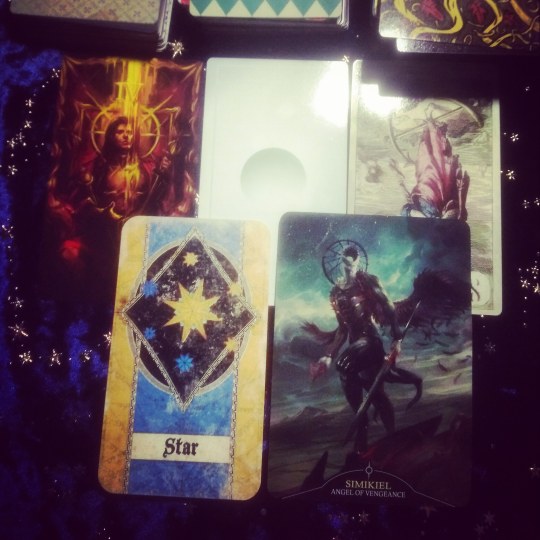
the emperor. the empty reversed. hope reversed. star. simikiel (the angel of vengeance)
You know, sometimes the thing that the asker asks, or the way they ask it, reveals so much about their situation - not even in a spiritual way, but in a mundane intuition kind of way; but sometimes I only notice the details in hindsight when I have already laid out the cards. It did strike me odd that you would ask me to speak on your inner child's behalf, since you know her like a thousand times more than I do. But once I laid out the cards, it all made perfect sense to me. 😳
I would think that you and your young self either don't communicate with each other at all and you dont know how to reach them, or you are quite at odds with each other and you dont know how to reach them in the more metaphorical sense. And the reason for that is that there is so, so, so much anger in there, that it's kind of scary. So you are either trying to block it out because this is not something that you want to identify with, or you are trying to connect but you are only met with ferocious hatred. 😔
And you know I'm not a therapist but I will explain what I think the cards mean and then think about it whether it's true, and preferably talk it over an actual therapist as well. The thing about your younger self is that she is still in there, frozen in time, and she hasnt made a lot of progress about anything, even though YOU probably have made at least some. That little kid, who is in there, was absolutely, horrendously betrayed by a world that she had the right to think was just, at that time (even though sometimes it isn't). And she has a ton of righteous anger about that, but nowhere to go and nothing to do with it. So it's kind of like a closed valve that is building up pressure.
I want you to remember that this kid was (and maybe in a way perpetually is) going through something really horrible and there is only one person who can help them. It's you. And if somewhere deep down you feel like she would say "I hate everything and ESPECIALLY you" then I need you to know what she really means is "Please help me." She just doesnt really know how to say that.
The angelarium deck I use very little, almost never, because whatever it says it always does in the most confusing way possible, but sometimes I do take it out when I have a feeling the reading is gonna be intense and it really was. Take this from the booklet:
[...] It is the way of Simikiel’s sword, cutting in both directions.
While we will gird our fragile hearts against being hurt, pain will make its attempts on us by any means necessary. It is in our soul to survive at all cost, even if it means violence. [...]
What I think scares you about anger is what you think it can do. But anger in itself doesnt really do anything, it's just an emotion. It's okay for anger to exist, and it has a right to. And the anger that is being stifled and squashed down, will always consume you. I mean this not just metaphorically but in the literal, physical sense too. Those are never completely separate.
The emperor card was really unique because i think that even though your younger self really despises the abuser, shes also like… still stuck in the stage where she identifies with what her abuser said/how they made her feel. You know, she's just a kid and that's how she was taught. Thats maybe something to think about, is that true and if yes than how to help it.
I don't feel confident advising anything on how to do that (yknow, not mental health advice) but I wanted to point out the Star card as a really good sign for you from an otherwise pretty drastic deck. This is not tarot, it's from the Deck of Many Things. Namely:
STAR: Immediately gain a +2 to one ability score.
I can't stress enough how little likely it is to get something so simple and positive with no repercussions or strings attached, so we have that going for you already. But what I'm thinking is maybe it's also trying to say that you are trying to take on too much of this work at once. Maybe try to focus on improving just one thing and open up your horizon gradually!
That would be it Sol. I really hope this could help a little, and either way I hope the best for you in your healing! 💜
july readings (3 of 5)
tips? 💗
1 note
·
View note
Text
my favorite WWE matches of 1997
Though I officially started watching wrestling in 1995 (my family famously first bought SummerSlam that year, which would be my first wrestling show ever, because it was $25.00. 1995 was a bad year for wrestling), I became a regular watcher of both WWE and WCW Raw and Nitro, and was able to buy my own PPVs, around summer of 1996, when Hogan turned. The first show I bought with my own money was In Your House: Buried Alive, though I kept up with weekly TV. And, for better or worse, I've been a fan ever since.
1997 was a REAL rollercoaster year for wrestling. The NWO was becoming a bloated mess in no time at all, Bret Hart was riding high, while he and Shawn Michaels publicly hated one another, a young Rocky Maivia was slowly transforming into the most charismatic wrestler of maybe all time, a young Steve Austin has broken his neck and can only work 5 minute matches but is somehow the most OVER wrestler in the company, and by the end of the year, the Screwjob happens, Bret's in WCW, Shawn's on handfuls of SOMAs (yet main-eventing). In a lot of ways, I'm grateful, because I side-stepped all of Hogan's WWF and WCW run. But it was a tornado of a year for a business always on precarious footing, as it ever has been.
And it gave us some CRACKING matches! - The 1997 Royal Rumble I love me a Rumble, and it's REALLY hard (but not impossible) to find a bad one (1993, 1995, 1999). And I personally love one with a storyline that runs throughout, and in this case, it's the ultimate heeling of Stone Cold Steve Austin. He visibly dominates the match until he hears Bret Hart's music, and then goes into panic mode. And it furthers the characterization of Bret's hand-spun narrative as being rightfully pissed that he's being taken advantage of by the roster, screwed by the company, and booed by the fans. Fun bonus: this is also the only Rumble appearance of lucha legend Mil Mascaras, who was so full of old-school carny spirit he famously refused to let anyone else eliminate him, so he eliminated himself, pissed Vince off, and was not spoken of again on WWE TV until the 2012 Hall of Fame ceremony, where he was inducted by his huge prick nephew, Alberto del Rio. - Bret Hart vs. Stone Cold Steve Austin, WrestleMania 13 This match is considered legendary, and for good reason. The greatest technical wrestler in the company vs. the best brawler, months of build, the world's most iconic (and off-the-cuff) blade-job (so much so that the visual of Austin bleeding in the Sharpshooter going "DAAAHHHH!" became the cover for his first VHS) and the wrestling world's most exquisite double-turn. It's fun, it's thrilling, it feels at once timeless and modern. Fun fact: there's a fun version of this match you can watch with just Austin doing commentary over it, and it's entertaining as hell. A true classic, and one of the greatest 'Mania matches of all time. - Ken Shamrock vs. Vader, No Holds Barred match, In Your House: a Cold Day In Hell Vader, famously, while a big teddy bear and a for-all-accounts lovely guy outside of the ring, had a reputation of being a bit "snug" with other wrestlers. Meaning he hit a little too hard, had little self-control, and took liberties with people, especially rookies and younger guys. It's supposedly why Shawn Michaels didn't want to work a world title program with him from summer to fall of 1996, because he was "too rough." But what never occurred to Vader is that trying that with a guy who's had 2 matches but has almost 5 years of MMA experience might not be the smartest or most prudent idea. Shamrock gives Vader as much as Vader gives him in this match, and there are moments where you can tell the guys are going into business for themselves. There's a moment where Shamrock is clubbing Vader with punches, and you can hear Vader, as he's turtling up and putting his arms up to block, yell "SLOW DOWN!" and then he rolls out of the ring to catch a breather. Vader, by the end of this match, is bleeding through his mask, a product of a broken nose, which is why I assume he gives Shamrock the stiffest short-arm clothesline I've ever seen. It's brutal, it's stupid, it weaves in and out of the script SO many times like a drunk man trying to stand up straight on a canoe, and I'm fascinated by each and every instance. - Owen Hart vs. the British Bulldog, European Championship Tournament Finals, Monday Night Raw, March 3rd Somehow, a workrate classic is stuck on a rinky-dink episode of Raw from Berlin, Germany. Smith and Hart blended some of their acquired WWE-style of work with classic junior heavyweight wrestling, complete with intricate reversals and fast-paced offense that was unlike either man's designed ethos of the time. Hart's shift toward his underhanded instincts as the match wore on provided enough story to balance the beautiful grappling from two men with impressive resumes. You can feel that these two knew one another, grew up together, and most importantly, wrestled together. An honest-to-God sleeper hit, but everyone who knows this match calls it a classic. - Shawn Michaels vs. Stone Cold Steve Austin, King of the Ring It's a concept that would be beaten into the ground in short order: Tag Team Champions that hate each other's guts. John Cena, seriously, has only been tag champions with people he's feuding with. That's
not even a joke. Austin and Michaels won the belts out of mutual dislike for the Hart Foundation, and then were programmed together for a wild match at the King of the Ring, one without a winner. Early on, the two actually pieced together a tremendous wrestling match full of nifty counters (prior to Austin changing his style after August for obvious reasons), before it degenerated into chaos after both men assaulted referees in the heat of the moment. Granted, neither man could really lose this one, so the screwy finish did serve its purpose. Until that point, it's a different type of incredible Austin match. You're never so happy to see a double-DQ finish. - Owen Hart & the British Bulldog vs. Shawn Michaels & Stone Cold Steve Austin, Monday Night Raw, May 26th And now we have a match set! The previous 4 participants in a brilliant and brutal tag team match. The Tag Team championship switch marked Austin's first piece of recognized gold in WWE, in a match on free television no less. That's not to insult the match any, as it was a pay-per-view quality fracas that barely slowed down. It is a mere 14 minutes long WITH entrances, but it moves at a clip, and everyone has their working boots on. It was a harbinger of days to come for this new period in WWE's history, and the crowd ate it up.
- Taka Michinoku vs. the Great Sasuke, In Your House: Canadian Stampede What happened here? Just when you think WCW had the cruiserweights cornered, WWE pulls this shit...and then kind of ignores it for a few months. But not before importing two of Michinoku Pro's finest to have a TakeOver-length exhibition. At first, the crowd in Calgary wasn't sure what to make of the undersized performers, but it wouldn't take long to win them over. From Michinoku's hands-free springboard dive to Sasuke's beautiful Thunder Fire Powerbomb, the expansive crowd was positively hooked on the daredevils with each passing minute. Although Sasuke wouldn't be long for the company, and Michinoku's run as Light Heavyweight Champion faded as 1998 wore on, the display at Canadian Stampede was a wondrous experience. This wouldn't have looked out of place in a Chikara King of Trios tournament. - The Hart Foundation (Bret Hart, Owen Hart, Jim Neidhart, Brian Pillman, the British Bulldog) vs. Team Austin (Stone Cold Steve Austin, the Legion of Doom, Ken Shamrock and Goldust), In Your House: Canadian Stampede I would have put this match on the list for the entrances and the finish alone. The crowd is at fever static for the entire match, seriously at the level of Punk/Cena at MITB 2011. And even though the Harts are the heels, they're in Calgary, and they get rock-star level ovations for merely existing. Everyone plays it mad and delighted, and you can tell they're all having a ball. Especially Pillman, who is just magically unhinged, a template for a young Dean Ambrose during their feud with the Wyatt Family. It is a magical, unreal main event, one of the best B-ppv main events maybe of all time. Well...other than MAYBE... - Shawn Michaels vs. the Undertaker, Hell in a Cell, In Your House: Badd Blood The very first Hell in a Cell match may very well double as the greatest of its kind. What stands out to me (other than how the match ends) is just how GREAT Michaels' selling is. When he's running away, he's constantly looking around for an exit, like a scared rat. When he finally gets caught and struck, he sells almost to the level he did for Hogan at SummerSlam 2005. But while he was doing that to make Hogan's offense look stupid, he's doing it here to make Taker's offense and anger look legit, and it somehow WORKS. But as fabulous as the match and the psychology is, it somehow takes a backseat to the debut of the Undertaker's monstrous little brother Kane, finally confronting his older brother in perhaps the greatest character debut in WWE history. - Mankind vs. Kane, Survivor Series I dunno what it is about this match that does it for me. Mankind's emotional lead-up to the match, where he's sad that Uncle Paul (Bearer) left him. Maybe the fact that Kane sells like Michael Myers, not so much that he's in pain, but as if he's never been hit in the face with a steel chair, a DDT or a piledriver. Maybe it's because Mick takes more horrific bumps than he needs to to make sure Kane looks like a legit monster. Maybe it's the broken Virtua Boy lighting. But it's genuinely unlike any other Mankind, Kane or ANY match I've seen before or since. It's a perfect somehow sympathetic serial killer vs. bigger, scarier serial killer that feels nothing story in a wrestling match. I didn't even know you could DO that.
5 notes
·
View notes
Text
It's 2007 and somehow, miraculously, Supernatural survives yet another rocky (?) season of mediocre ratings to come back for a third season, or at least, half season, but that season starts out with a real bang! Like, just a real solid trio of an opener for season three. It reminds me of all the things I love about SPN and also it reminds us of all the things that frustrate the hell out of me on SPN. So where did we leave things off?
First up, there’s Dean, who sold his soul to the devil in order to bring Sam back from the dead. Sam, you’ll remember, was part of some overly complicated ponzi scheme to find the perfect vessel to open a door - yep, open a door - and lost to Aldous Hodge who just straight up murders Sam in the season finale. So Dean get’s Sammy back, but in exchange, he’s only got one year left before he permanently moves down south. Oh! And even though they got Sam back and Sam kills Aldous Hodge (RIP pal), they neglected to keep the door from opening. The door to Hell, that is, and now they’ve allowed a shiz ton of demons out to freely roam the earth. Way to go, boys, you lost again! They are two for two on these season finales guys!
OH but they DO kill the Yellow Eyed Demon, so that’s a plus, but not before he plants the most perfect seed of doubt in Dean’s mind - “How do you know what you brought back is all Sammy?” Like, ugh, UGH, ugh!!!! What a way to drive the knife in deeper! What a way to make the heart of this show slowly start to crumble! C’est Magnifique!! *chef's kissy fingers*
So with all that emotional baggage weighing us down, how do we start season 3? How else - with a threesome of course! And also some technicolor grading, it’s wild guys.
Oh boy guys, let’s talk about this opener for a hot sec. I got into it a little bit last season, but as much as I love Dean, you HAVE to admit that that boy is gross. Just like...he’s a little gross. I’m also old enough now to see exactly how many red flags he’s raising through the last 45 episodes. Like, sorry Little Me, but he is not boyfriend material. Not to mention that all this debauchery is 1,000% him distracting himself from the consequences of his own actions, but we’ll get into that later.
Meanwhile, Sam is doing something constructive and trying to figure out how to reverse the curse and save Dean’s soul. And here we have the culmination of two seasons worth of character development - faced with the imminent demise of Dean Samuel Winchester, Sam tries to step up and take care of his brother for once in his life; Dean parties like it’s 1999. There were two things I thought of during this episode - 1) isn’t this not unlike the sort of behavior you see in suicidal people who have finally decided to take their own life? Which is just, like, further held up by the fact that Dean’s big monologue at the end literally has the line “Truth is I’m tired, Sam. There’s a light at the end of the tunnel.” and like...dude, you are NOT ok! Why isn't??? ANYONE??? ADDRESSING THIS????? And 2) Dean is sharing a lot of similarities with the demons in this episode.
Because MEANwhile, there’s demons! So many demons! Specifically, the Seven Deadly Sins ones, but also, spoiler alert, Ruby, who is gettin’ reeeeealll into that ketchup.

All these baddies just really taking advantage of their time topside cuz Hell is, as they so artfully put it, it’s like Hell, so they’re just livin’ it up while they still can ~almost like foreshadowing or something~?!?!?
Real talk though, it being a real long time since I’ve watched this season, it’s these kinds of details that I’m impressed with this time around. There is so much character work that goes into this show and it’s something I definitely connected with the first time around, but not on conscious level. Now I can look at it through time and experience and articulate what I’m seeing, which makes this re-watch infinitely more enjoyable.
Episode 1 of this season continues what they started in season 2 and just keeps building out that Hunter Community. Like, there really is a whole Community out there that keeps in contact and works together and makes sure everyone’s up to date on the latest hot goss, and it all makes John Winchester come off like a real creepy splinter cell lone gunman type. And that in turn makes the Winchester sons look like total, unprofessional boneheads who managed to open a portal to Hell. “UGH Great Jorb Guys, but can we blame them? They’re John’s kids,” is a conversation between hunters that I am headcannoning, but also 100% support.
Honestly, I love the idea of the Winchesters being just these real, like, b-grade, Walmart Brand Hunters that other Hunters are just SO done with. We kind of see a little bit of that with Isaac and Tamara, but by the end of the episode, the Winchesters prove that they’re...better Hunters? I hope somewhere in the next 12 seasons I get an episode that is told from another Hunter’s POV who is legitimately better/more emotionally balanced than the Winchesters and the whole episode is them just, like, cleaning up a bunch of Winchester messes like, SONuvabitch, these two ASSholes. I think we see a fair amount of episodes from the POV of people who are less qualified than the Winchesters who end up being mentored by them, but I’d be stoked for them to run into just a group of people who hate them for totally legitimate, professional vs amature reasons.
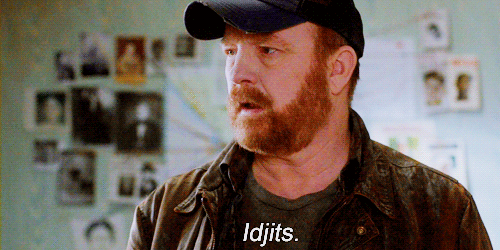
Bobby does not count because Bobby signed up to be their Dad and so he agreed to take care of their messes when he took that job.
And then we get to “The Kids Are Alright” which showcases one of my fav changes for this season - BRIGHTLY! LIT! HIGH! SATURATION!!!! And of course, by fav, I mean, Most Hilarious.

I do walk a fine line on this one truth be told. Like, season 1 was definitely going for A Look. It’s super gritty and high contrasty and stylized. Now, I got what they were going for but I wasn’t always crazy about it, mostly because the quality on the DVD’s was terrible. Quick tip for everyone: in order to get 2+ hours worth of content on a DVD, you have to compress the final edit of the program to a pretty small bitrate. When we drop videos onto DVD’s at my work (it isn’t often, thank goodness), the discs themselves only hold, like, 2GB worth of content and that is NOT A LOT when it comes to video files. The more compressed a video file is, the less detail you’re gonna get in the visuals. Watching episodes on Netflix (where everything’s probably at a higher bitrate and therefore is a better quality visual), it’s not bad, but on my DVDs, the compression is so heavy that we get SUPER hot highlights and SUPER crunchy shadows - what a lot of people would called “crushed blacks” because you’ve lost all the detail in the shadows and you’re left with a grainy, noisy, black hole on the screen. Like I lost so much detail in the pilot episode guys, I could not make out this guy’s face.
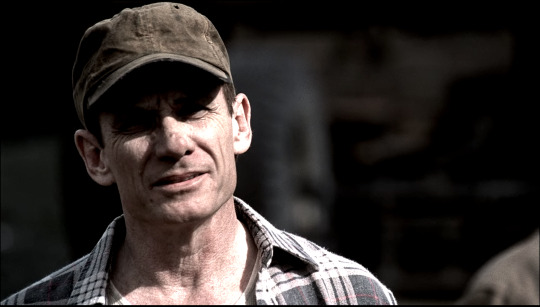
A rough approximation of my DVD quality. Still recommend it over Netflix for the Accurate Soundtrack tho.
Season 2 SPN toned that Look down a lot, like, a lot a lot. Enough that you still got the general vibe they were going for but not enough that you couldn’t make out faces anymore. But through this whole process, the CW execs kept pushing for the show to look lighter, more colorful, less film noir more...well, CW. And in season 3 it finally happened!!!
I get what those execs were going for, but also, I feel like the colorists on these first few episodes just REALLY went wild out of spite. Lookit this shot from “Magnificent Seven” right before Envy causes some rando innocent bystander to beat a girl to death for her shoes -
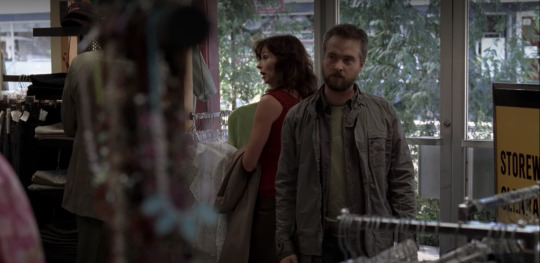
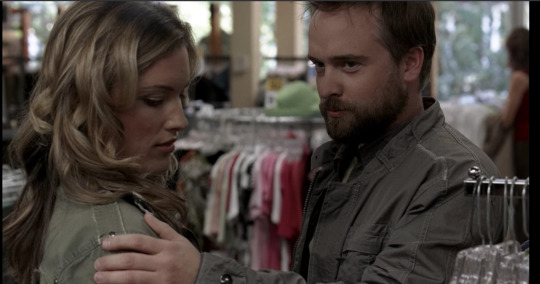
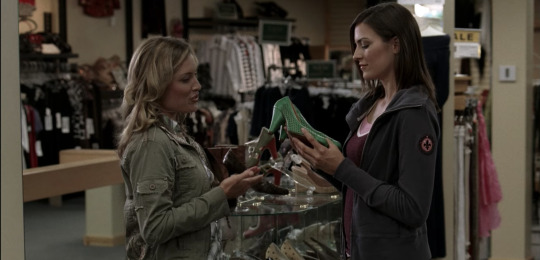
GREEN GREEN GREEN GREEN!!!! I WONDER WHICH SIN THIS GUY IS????
Then in “The Kids Are Alright” the birthday party looks like everything is coated in day-glow neon.
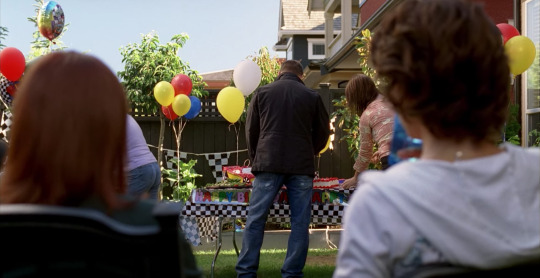
The Winchester Bros look like they just got back from 3 weeks in Aruba - LOOK at the saturation levels in these skin tones! LOOK AT THEM!!
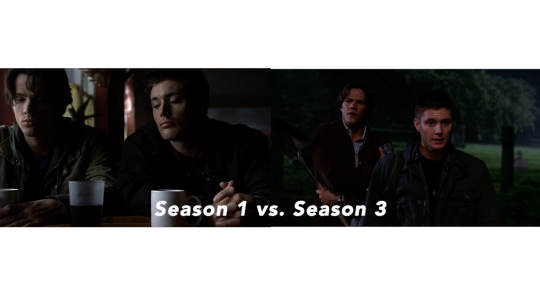
My screencap ability aside, only in SPN can a cemetery at night have brighter lighting than a diner in the middle of the afternoon.
This is definitely a thing I will be tracking the rest of the season because I have a distinct memory of a future episode where the brothers have been magically gifted completely different lives where they were never Hunters, they know nothing of Hunting, and they’re completely normal until the end when everything gets snapped back and the episode literally changes colors. V. Excited to see just how saturated this season stays through the end.
But maybe more importantly in “The Kids Are Alright” we learn that Dean does NOT, in fact, have a son. Not that he would be a good father...well...maybe? I mean, this Dean, this season 3, definitely-suicidal, completely-reckless, can’t-keep-it-together Dean, is not good Dad material. Later seasons Dean? Probably fine? Earlier seasons Dean might ALSO be fine? And if he’d found out that Ben was his legitimate kid, it could have made a WORLD of difference, who knows. I know he ultimately does become father-like to Ben and that gives me a lot of feelings. But this Dean is not in a good place to take care of anyone, including himself and really, someone ought to do something about that.
I gotta say, this is an actual bummer. I can’t remember if, in the later seasons, they do any clarifying on this or not, but I am legitimately bummed that Ben is not Dean’s kid and that as far as we know, Dean has no natural children floating around out there with surly attitudes and soft hearts. Dean’s motivation from Day 1 has always been family and despite what comments he may make in early seasons, Dean’s secret desire is to have the wife and the kids and the dog and the white picket fence. And honestly, we’re only 3 seasons in and I just want Dean to have nice things!!
And then guys, we come to “Bad Day at Black Rock,” and I just...WHAT a masterpiece. I had almost NO memory of ever watching this episode before and I don't understand why. What a glorious masterpiece this episode is. Let’s make a list -
More Hunters™, who should be really annoying but were actually kinda charming in a Marx Brothers kind of way
Gordon’s in jail, where he belongs, but also is masterminding a coup against the Winchesters which is A+ spooky stuff
Slapstick comedy that I didn’t know I was missing from my life
Bela F*cking Talbot

Guys, I think this is my fav episode so far purely because I felt, while watching it, that the last 10 years of my life were not in vain and that I had in fact grown as a human person. I remembered hating Bela Talbot. Like, I DID. NOT. LIKE. HER. To the point that I questioned if her British accent was even real. It is, her mother is from the UK and she lived there for a time, but like, honestly, the audacity of Little Me.
This time around? Oh she’s defs my new fav. Just everything about her is like, A+, Great Job, Why-Did-We-Cancel-Her??? Like, oh yeah, probably because somewhere in here they try to shoehorn a romantic side plot with Dean. I don’t actually mind rioting over shoehorned romance, but also, if they’d let this play out for a season or two and then got the two of them to bone? I’m on board. I’m 100% on board.
Maybe it’s just that she is unapologetically out for herself, maybe it’s the fact that she is definitely a match for the Winchesters in a non-murdery way, probably it is both of those things. She's smart, she’s crooked, she has impeccable taste, she’s honestly a helluva lot of fun and I am so excited to see more of her and so BUMMED that she will not make it past this season.
Despite the fact that I absolutely adore all three of these episodes, they also bring up the problem that I was starting to see in season 2 - WHO is this show about? Isn’t it supposed to be about the Brothers as a whole? But the majority of these first three lean pretty heavily on Dean’s emotional arc. Granted, it makes sense. I mean, of COURSE Dean’s demon deal is gonna be the BIG thing in a season where he is literally staring down the barrel, but knowing that there’s a side plot about Is Sam Evil?? seems like...something we should really explore more? I believe it comes up in season 4, or at least, Sam’s demon-blood powers become a bigger deal in season 4, but I would have enjoyed seeing Sam have a more active stake in this season. I can see planting some weird new ticks being planted for Alive-Again Sam that just get weirder and darker and then a mid-season finale or a run up episode to the end of the season where Dean (finally) decides he needs to stop his demon deal because he needs to stick around so he can keep Sam from going completely off the rails. As much as I love Dean 5ever, I do think the show works best when the emotional weight of the season is distributed equally is all. And to be fair to the writers this season, there could have been a bigger plan for something like that but they ran out of time - their season was cut by about a third due to the Writer’s Strike.
Still, all in all, a solid opening to the third season. I want to say that these episodes feel like Classic SPN, but then I remember that this is season three out of fifteen. These ARE Classic SPN. Mostly self contained with enough emotional drama to remind us of the overarching plot. Maybe a little heavy on the emotional drama, but Dean’s only got a year to live and the show’s only got 16 episodes to resolve that crisis, so it’s fine.
#Supernatural#Supernatural rewatch#Season 3#Magnificent Seven#The Kids are Alright#bad day at black rock#Sam Winchester#Dean Winchester#Bela Talbot#Hunters#Sam and Dean#Writer's Strike#TV#TV History#Bela talbot is maybe great#and I should say it
6 notes
·
View notes
Text
Doctor Who: Why Does Everyone Keep Forgetting the Daleks?
https://ift.tt/3g81nbE
A scene that did not appear in New Year’s Day’s Doctor Who Special, ‘Revolution of the Daleks’.
SCENE: EXT. 10 DOWNING STREET, A PRESS CONFERENCE IS BEING HELD
PRIME MINISTER JO PATTERSON: …and so I introduce to you, our new, fully automated defence drones!
A “DEFENCE DRONE” GLIDES INTO VIEW.
JOURNALIST (RAISES A HAND): Hello, Jeff Typeface, Daily Exposition. Sorry but, um, isn’t that just a Dalek?
PM: A what?
JOURNALIST: A Dalek? About twelve years ago they transported the entire planet through space then rounded humans up in the streets and exterminated them?
PM: Hmmm. Doesn’t ring a bell.
ANOTHER JOURNALIST: Yeah, and a few years before that a bunch of them came flying out of Canary Wharf?
PM: Sorry, I’m completely drawing a blank.
JOURNALIST: Come on! They murdered one of your predecessors!
PM: Excuse me, but you can’t honestly expect me to remember every single British Prime Minister that suffered a violent death over the last two decades. We all know this job has the life expectancy of a Defence Against the Dark Arts teacher.
PM’S ADVISOR: Actually, Prime Minister, talking of your predecessors, Winston Churchill did try this exact same plan with a very similar looking contraption during the War, and I hear that went badly.
PM: I mean, I’m sure I believe you. I’m just saying this is all news to me.
JOURNALIST: Very well. Moving on, how will these “Defence Drones” help us deal with the Covid-19 pandemic?
PM: See, now you’re just making words up.
Doctor Who has always been a series that points and laughs at fans who want to try and piece together a consistent continuity across all its stories, but even by Doctor Who standards, forgetting an entire global invasion barely more than a decade ago (y’know, just before most of the show’s viewers were born, you absolute fossil you) might seem like a stretch.
Of course, the real reason Jo Patterson couldn’t remember the Daleks is that unlike say, the MCU, where weirdness layers upon weirdness to create a world that almost counts as alt-history, Doctor Who is, on some level, always reaching to be set in “our” universe. The key conceit of the show is that you might turn a corner, find a blue box, and suddenly be whisked away through space and time to a world of adventure. Which doesn’t really work if the British town squares of the Doctor Who universe all feature memorials to the victims of the Daleks and diet pills have to be tested for Adipose DNA.
But at the same time, Doctor Who just loves a great big Hollywood space invasion, and making these two core ingredients of the show mesh is a nightmare for continuity.
Let’s, for instance, take a look at the life of recently departed Doctor’s companion, Ryan Sinclair.
Life of Ryan
Ryan was born in 1998 or 1999. As a child, he attended Redlands Primary School at around the same time London was hit by a “terrorist attack” when shop windows dummies started shooting people. A year later a spaceship crashed into Big Ben, although this was later dismissed as a hoax. That Christmas Day, when Ryan was around eight years old, every human with O negative blood got up in a trance and went and stood on a tall building while a gigantic spaceship hung over London.
Still Ryan is a kid, he doesn’t watch the news, maybe nobody in his family is O negative and let’s face it, news of a lot of this stuff probably doesn’t get as far as Sheffield.
However, even in Sheffield he would have seen the regular “ghost shifts” that appeared all over the world, and at nine years old he would have been traumatised to have his home, like so many others, invaded by Cybermen before they all got sucked away by something.
His family make the wise decision not to turn on the news that Christmas, so he doesn’t hear about the “Christmas star” attack, or later that year a hospital being teleported to the moon, and while he probably remembers grown-ups getting very excited by Harold Saxon getting elected, fortunately most of his tenure as Prime Minister was erased from history.
Read more
TV
Doctor Who: Which New Doctors Are Now Canon?
By Chris Farnell
TV
Doctor Who: the genius of making the Cybermen an ideology
By Chris Farnell
Ryan would have noticed when CBBC was replaced by a giant eyeball shouting that “Prisoner Zero Has Escaped”, and, shortly after turning ten, he definitely would have noticed when the entire sky was set on fire to prevent a Sontaran invasion.
And then of course, the Earth was teleported across space, planets filled the skies, and Daleks roamed the streets rounding people up. He would have been about the same age as future astronaut and Mars colonist, Adelaide Brooke at this time, and she was profoundly affected by the experience.
After that it’s possible the government may have rounded up him and his classmates to offer up to the 456.
To round the year off, Ryan actually turned into Harold Saxon for a bit. This was probably, on balance, the worst Christmas of the lot.
2011 was largely uneventful except that nobody could die.
Ryan went on to see the Tenth Doctor light the flame at the 2012 Olympics, was briefly into that whole “mysterious black cubes” craze before they got banned for some reason, and while he was in high school the entire Earth was covered in dense forest overnight but that disappeared, and nobody ever mentioned it again. The Cybermen invaded again. Then, not long after Ryan left school, the entire world was taken over by a species of really gross looking mummified monks who claimed to have always been in charge, before they also disappeared overnight.
Not long after that, Ryan met the Doctor for the first time and was shocked, shocked, to discover that aliens exist.
Cracks in Time
Steven Moffat did give us one handy explanation for why nobody in Doctor Who remembers the Dalek invasion, or the giant steampunk Cyberman that invaded Victorian London, and probably much more. In ‘Victory of the Daleks’ the Doctor tries to persuade Winston Churchill that using his own force of Daleks to secure the country was a bad idea, and he turns to Amy, who would have seen that invasion, to back him up. She has no idea what’s he’s talking about.
Later it’s revealed this is because the TARDIS explodes, destroying the entire universe with it. The cracks in time left by that explosion erased all kinds of events from history, including, handily, anything that would cause the human view of the universe to deviate too far from the real-world status quo.
Of course, that does leave some problems. Adelaide Brooke, again, clearly remembers the Dalek invasion and it was a moment so formative and influential on her eventual Fixed Point In Time that even the Dalek she saw (who, I remind you, was working on a plot to destroy literally all existence) didn’t dare exterminate her because of its influence on the timeline. And since it’s not implied the crack in time could bring anyone back from the dead, it does make you wonder what history says happened to Harriet Jones (former Prime Minister) and all the many others killed by the Daleks.
But maybe you don’t need a giant retconning Crack in Time?
Because while the Doctor has often waxed lyrical about humanity being indomitable, creative, and curious, there is also a lesser innate human quality the Doctor sometimes mentions: our absent-mindedness.
The Forgetfulness of the Daleks
As well as the Dalek incursions in ‘The Stolen Earth’ and ‘The Army of Ghosts’, there was another Dalek visitation of Earth in the ironically named ‘Remembrance of the Daleks’, which was set in 1963. During this adventure then-companion Ace points out she doesn’t remember anything about Daleks invading in the 1960s. The Doctor replies, “Do you remember the Zygon gambit with the Loch Ness Monster? Or the Yeti in the Underground? Your species has an amazing capacity for self-deception.”
Likewise, nobody remembers dinosaurs invading London, or the other time shop window dummies came to life and started killing people, or when the Earth encountered its exact twin. Without any cracks in time hanging around, Doctor Who falls back on an old staple of fantasy and sci-fi- that humans just ignore anything that doesn’t fit into their worldview.
As we’ve already mentioned, this turns up a couple of times in the new series as well. In ‘In the Forest of the Night’, the entire planet is overnight covered in forest for reasons that we’re not going to go into too closely because that story’s a bit of an embarrassment to be honest. As the forest disappears at the end of the story the Doctor says it will be forgotten outside of fairy stories, because that’s “a human superpower”.
It can even work two-way. In ‘The Lie of the Land’, the entire Earth is taken over by the gross-looking and mysterious “monks”. Using a psychic link, the monks convince humanity that not only are they humanity’s generous benefactors, but also that the monks have always been here, guiding human evolution. This is of course a lie, as the monks are actually one of the very few aliens not to have guided human evolution at some point.
After the Doctor does his thing and the monks’ statues are torn down, someone passes by the ruins of one and wonders what it was. Already, people are forgetting.
cnx.cmd.push(function() { cnx({ playerId: "106e33c0-3911-473c-b599-b1426db57530", }).render("0270c398a82f44f49c23c16122516796"); });
Which, if you think about it, is a Doctor Who story in itself. Imagine being an alien visiting Earth. Humanity must seem like the Silence, but in reverse- as soon as they stop looking at you they forget you exist. The Doctor really ought to take a look at that some time.
The post Doctor Who: Why Does Everyone Keep Forgetting the Daleks? appeared first on Den of Geek.
from Den of Geek https://ift.tt/3bcKfBX
4 notes
·
View notes
Text
Reverse 1999 Analysis: Why did Jessica go with Vertin in the Green Lake event?
Note: This was originally an Ask but I feel like posts are easier to find in my messy blog. Also I can fix typos and make edits when new information comes out!
The answer to this lies in Blonney and Vertin’s proposals to Jessica. Blonney offered her a life as a human where she’d be forced to hide and Vertin offered a life as an arcanist where she can embrace her true self. The Green Lake event builds up to this conclusion in subtle ways more noticeable in hindsight. The main theme of the event is embracing your true self. This applies to Jessica as much as it applies to Blonney.
From the beginning of the event, we see how the humans treat Blonney. With limited access to the outside world, this gives Jessica her first impression of humans beyond Green Lake. They belittle and tease Blonney. In Jessica's eyes, Blonney is the most amazing person she knows (not that she knows many) and she still gets treated this way. Not only that but Blonney resented her arcanist blood because of this mistreatment.
If someone as amazing as Blonney is being rejected by humans, what hope could a Changeling like Jessica have fitting in? Instead, Jessica would rather make Green Lake a place they can be happy together. She expresses no desire to see the outside world.
Later, she meets Vertin and the others. She notes they are different from the people she normally deals with. They are arcanists who embrace their roots and the weirdness that comes with it. As the story goes on, the team falls into “roles”. Tooth Fairy is the mediator. Sonetto is the one who gets stuff done. Horrorpedia is an information bank. Vertin is the problem solver who puts all the information together with Horrorpedia's help.
While Jessica was acting the entire time, the team's reactions are genuine. Vertin being the emotional support after she kills the butcher and asking her what her wishes are later are genuine acts of kindness. Jessica even mentions she's grown to like Vertin when they are talking about wishes. This is important because while Blonney is lying to herself throughout the event (hating horror movies, denying her heritage, etc) everyone else has been straightforward and honest (too much in Horrorpedia’s case).
Then we have the ending. What makes Blonney and Vertin's proposals different?
It starts here:
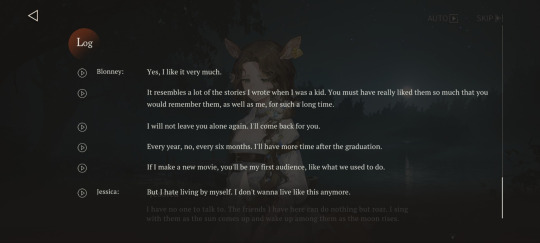
Blonney tries to bargain with her without truly understanding the problem. Jessica explains that in the time Blonney was away she grew up and changed. She doesn't want to wait anymore.
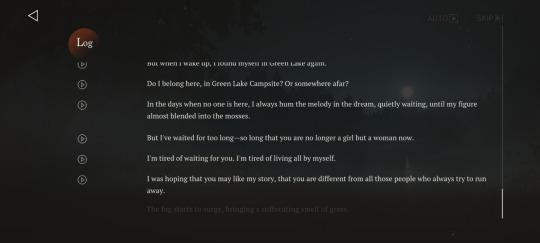
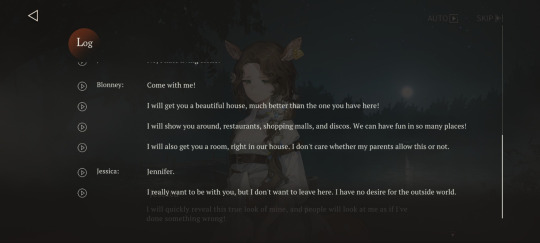
Here Blonney tries again, making an offer she may not be able to uphold (parents). She lists a bunch of things she likes to do to try and convince Jessica but Jessica had a taste of the outside through Blonney's colleagues. Jessica brings up the fact one day her true form will be revealed and she'll be treated like a freak. She also doesn't understand a lot of the things Blonney is bringing up. Overall the proposal feels flimsy. Blonney is not only saying these things to try and escape. She truly wants Jessica to be happy too but she doesn't know how to accomplish this. Also, while Jessica loves Blonney a lot, it doesn’t negate the fact that up to this point Blonney has been in denial about a lot of things (though she shows a lot of growth). If Blonney doesn’t believe in her own words, how can Jessica?
Vertin tries another route with similar intentions. She walks Jessica through why it wouldn't work because even if she stayed, things would get stale for Jessica. Keeping people here is not the key to her happiness, it only numbs her loneliness.
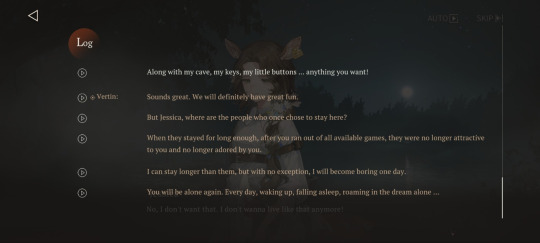

Vertin the problem solver addresses her fears of rejection, loneliness, and boredom. After this, she brings up the crazy things she's seen around the world to entice her interest. She is not using discos or malls to convince Jessica, but instead the dreams she has of music, meadows, and arcanist tomfoolery. She is offering her the life of an arcanist not the life of a human like Blonney did. Blonney is beginning to embrace her heritage, but she still has that human lifestyle etched into her persona. The things she offered are more associated with humanity than arcanum.
Then Vertin says this:

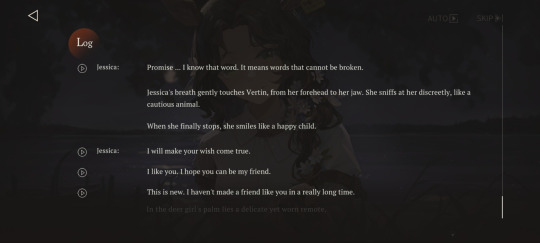
She promised to give what she can offer. There are no grandiose claims like Jessica who thinks she can be everything someone needs or Blonney who wants to offer things but she doesn't have the means to realize them. Vertin is offering to do what she can. That is also why she is the only one able to make a promise. I don't even think Jessica used the word "promise" when she was making her offers meaning there is extra weight behind the word in her eyes. In Vertin’s department, she can truly be herself without fear of rejection or feeling like a monster.
Note: Jen and Jess are gay af for each other. I don't think Jess choosing to go with Vertin invalidates her love for Jen. Jennifer needs to come to the Suitcase once she graduates! Jess couldn't go to her, but she can come to Jess. It all works out!
#reverse 1999#a nightmare at green lake#green lake#analysis#blonney#jessica#vertin#i know i will find typos later
80 notes
·
View notes
Text
Know My Name: Brandon Bernard

“I’m sorry. That’s the only words that I can say that completely capture how I feel now and how I felt that day.” These were the final words of Brandon Bernard. On December 10th, Brandon Bernard, aged 40, was executed with a lethal injection in Teree Haute, Indiana. Brandon Bernard received the death penalty following his involvement in the 1999 killings of two married youth ministers; Todd, and Stacie Bagley. He was eighteen years old at the time of the incident.
By January 20th (The date of Joe Biden’s inauguration) the Trump administration will have fast-tracked the execution of 13 prisoners. Over half of these prisoners are African American. For the first time in US history, Trump’s administration has executed more American civilians than all states combined and any federal government in previous years. Alongside this, the Trump administration is pushing for the employment of more execution methods. The new rule would permit executions through lethal injection, poisonous gas, firing squads, electrocution and/or hanging. Holding conflicting views, Joe Biden’s vow to eliminate the death penalty has put even more pressure on Trump to pass the bill. If Trump’s plan succeeds, the new President would be overwhelmed with paperwork fighting to reverse the indecent legalisation. Until these actions can be amended, death row inmates are forced to endure horrific trauma in their death. These federal executions exemplify a troubled criminal justice system riddled with racial bias and longstanding inequality that continues to treat black prisoners like the worst kind of criminal. The concerning truth is that more than 40% of the remaining 54 people on federal death row are Black, despite African Americans making up 13% of the US population.
In response to the execution of Brandon Bernard, his attorney Robert Owen, retaliated by stating that the “death sentence [is] clearly shaped by racial bias.” He said, “it really ignores, and in some ways, offends the growing recognition […] that the legal system has not been fair to people of a minority race." Developments in the case resulted in a last-minute plea for Brandon Bernard to be warranted clemency. Bernard’s lawyers argued that Brandon should have remained in prison for life with parole as he remained a model prisoner throughout his sentence. Brandon had a high record of good behaviour and worked with many outreach programmes promoting crime prevention. 5 out of 9 of the original jurors responsible for sentencing Brandon Bernard disagree with their original decision to sentence him to death in 2000. Gary McClung, one of the jurors said, "The death penalty is far too harsh for his level of involvement in this crime." New evidence in the case suggested that Brandon Bernard was not a leading role in the murders. Whilst Brandon was one of five teenagers involved in robbing Todd and Stacie Bagley, Christopher Vialva was the ringleader orchestrating the crime. Vialva shot the two victims in the head, killing Tod instantly. The two bodies remained in the car, whereby Brandon proceeded to set the car on fire. During the trial, the prosecutors argued that Stacie died as a direct result of the fire that Brandon had started. This was the main driving force behind the juror’s decision to give Bernard the death penalty. Once the trial was complete, a private medical examiner hired by the defence determined that Stacie was “medically dead” before the fire had started. Brandon Bernard committed arson, he did not murder the two victims and thus was not warranted the death penalty.

The Black Lives Matter Movement is appealing for the abolition of capital punishment in the U.S on the basis that the death penalty is a “racist practice” that devalues Black Lives.” The Black Lives Matter Movement emerged in 2013 as a Twitter hashtag. It started over the release of George Zimmerman, a man who shot and killed Trayvon Martin. He was an unarmed 17-year-old black teenager. Since then, the movement has spoken out for countless other deaths sparked as a direct consequence of racism in the U.S. know their names: George Floyd, Breonna Taylor, Eric Garner, Michael Brown, Jacob Blake, and most recently Bernard Brown. In most recent times, BLM embodies a global socio-political movement protesting against racism and discrimination in the fight for liberty, justice, and freedom. In the Wake of last summer when the world witnessed the murder of George Floyd, the Black Lives Matter movement flooded mainstream media, causing millions of people across the world to stand in solidarity with Black Lives.

The promotion of social media has been a huge influence on raising awareness and coverage of racial inequality. Mass audiences have witnessed extensive material on race-based interactions and visible acts of violence committed to black lives through Twitter, Instagram, Facebook, and even TikTok. It contributes to the exposure of everyday racism and racist policing, reaching a mass white consciousness. The input of celebrities and influencers have made huge contributions that benefit the Black Lives Matter movement. Petitions gain major publicity, followers are encouraged to donate and many people are urged to speak out against racial injustice. The most recent BLM trend vocalised support for Brandon Bernard through the #JusticeforBrandonBernard hashtag, which was trending on Twitter and TikTok. Kim Kardashian, a vocal advocate for criminal justice reform, had spoken out against the death penalty, pleading for Donald Trump to extend Brandon Bernard’s sentence. Alongside this, other small influencers and social media users drew attention to Bernard’s case in the hopes that it would raise enough support to push the execution date back. In many ways, the efforts of social media succeeded. An online petition for President Trump to halt the execution of Brandon Bernard has reached over 719,000 signatures and counting. Despite such positive efforts, these actions were not enough to save Brandon Bernard. Subsequently, Kim Kardashian has since shared her distress surrounding Brandon Bernard’s execution on Twitter. In a series of Tweets, she said, “I’m so messed up right now. They killed Brandon," she continued by saying "He was such a reformed person. So hopeful and positive until the end. More importantly, he is sorry, so sorry for the hurt and pain he has caused others." After spending time with Brandon Bernard as part of her campaign around criminal justice, the Kardashian insisted that Brandon was a genuinely reformed prisoner.
Whilst Brandon Bernard is a victim of racial bias in the American justice system his case does not account for the vast amount of lives lost to racism and discrimination. Studies show that 82% of death row inmates were convicted when the case involved white victims, and yet, over half of all homicide victims are non-white. The reality is that the death penalty is a natural progression of America’s deep-rooted issue with race. From slavery, lynching’s and Jim Crow laws, the death penalty is an “instrument of social control.” Below is a side by comparison of the United States. On the left side, the graph highlights the distribution of lynching’s whilst the right side highlights the allocation of executions of Black people. The resemblance between the two graph’s is astounding.

Guilty until proven innocent. This is the attitude surrounding U.S criminal convictions that leads to the suffering of innocent black lives. Over the last few decades, the increase in exonerations of innocent criminal defendants has raised concern over the issue of rightful conviction. A study conducted by the University of Michigan Law found that 12% of exonerations were innocent defendants given the death penalty, even though death row inmates make up 1% of the United States Prison Population. A more recent study has looked further into the reasons men and woman are wrongly convicted. It found that 54% of defendants are victimized by official misconduct. The Police are responsible for 34% of wrongdoings, whilst 30% is down to the prosecutor. In many cases, both of these factors are responsible for the wrongful convictions. Since 1993 eighteen people serving time on death row, have been proven innocent and exonerated by DNA testing in the United States. Know their names: Rolando Cruz, Alejandro Hernandez, Robert Miller, Earl Washington and Michael Blair.

Troy Anthony Davis shares a strikingly similar case to Brandon Bernard. Troy Anthony Davis was executed on the 21st September 2011 in the state of Georgia. Davis was executed for the murder of a police officer, despite proclaiming his innocence till the end. Months before the execution, people around the country pleaded with Georgia to reconsider the execution as there was a build-up of doubt surrounding Davis’ conviction. In 2011, at the height of the Troy Davis plea, The Guardian compiled a list of evidence that pronounced Davis was innocent. The article addresses the nine witness statements from Anthony Davis’ trial in 1991. Whilst the witnesses stated that they had physically seen Davis shoot the police officer, many statements were recanted years later. Some witnesses even came forward and admitted that the police forced them to cooperate out of fear of being put on trial themselves. Anthony Davis received the support of politicians, the NAACP, the Innocence Project, and Amnesty International. It was a worldwide movement, fighting to save Troy Davis. The Twitter hashtags #TooMuchDoubt and #TroyDavis erupted as people around the world watched Georgia take the life of an innocent man. Protests lit up around the world. Hundreds of people even protested at the United States Supreme Court following the deliberation of Troy Davis’ appeal. Petitions received over 1 million signatures for Troy before he was executed and yet millions watched in disbelief as justice failed to be served. Anthony Troy Davis had one final message to share with the world on the morning of his execution. He said, “The struggle for justice doesn’t end with me. This struggle is for all the Troy Davis’s who came before me and all the ones who will come after me.”
If the death penalty ruins so many lives why is it still permitted under the US constitution? Capital punishment is an intolerable denial of human rights and contradicts the fundamental values of the United States constitution. The imposition of sentencing a life to death is illogical. The death row penalty revokes any opportunity for death row inmates to benefit from new evidence or new laws that could potentially alter the course of their fate (especially when they’re innocent). Most arguments claim that capital punishment acts as a deterrent from committing criminal activities, however, this claim is deceptive. Scientists agree, by an “overwhelming majority,” that the death penalty does not deter serious felonies from being committed. A 2012 report by independent researchers at America’s National Research Council disparaged the idea that the death penalty prevents homicides. It found that US states still practising the death penalty shared similar statistics in the rate of homicides to US states without the death penalty.[1] Dr Jonathan Groner, a professor of surgery at Ohio State University, argues that the “psychological mind-set of the criminal” at the time of the crime do not consider the “consequences.” He said, “ most crimes are crimes of passion that are done in situations involving intense excitement or concern.” Perhaps, capital punishment is far from making society safer but rather endorsing the use of violence that permitted prisoners the death row in the first place.

Encouragingly, the recent release of the 2019 film ‘Just Mercy’ directed by Destin Daniel Cretton, depicts life on death row, and exploits the racial bias that subverts the U.S criminal justice system. Opening up to the theatre’s on January 10th, 2019 the release date shares the same date as Brandon Bernard’s execution. The coincidental outcome of these events only emphasises the significant meaning behind the message of the film. The true story explores the work of civil rights lawyer and activist Bryan Stevenson, starring as Michael B. Jordan. In this biographical account, the audience watch as Stevenson fights for Walter McMillian, portrayed by Jamie Foxx. McMillian was sentenced to death in Alabama in 1988. The wrongly convicted man spent six years on death row after being framed for the murder of an eighteen-year-old white woman, despite numerous evidence and eye-witness accounts proving his innocence. The most note-worthy quality of ‘Just Mercy’ directly lies in the film’s ability to humanise prisoners on death row. Exploring the suffering and pain that death row inmates go through sheds a whole new light on the destruction and bloodshed that comes attached to capital punishment. In one review by Murphy and Tacke, two catholic activists who support the abolishment of the death penalty, said, "Every time we justify the use of the death penalty we lose a piece of our own humanity and make way for a society where vengeance is valued above true restorative justice."
In an interview with ABC news, Michael B. Jordan spoke about the impact this film had on its audience. He said, “if you leave this movie feeling hopeful and inspired and optimistic…educate yourself.” He continued. “ Exercise your right […] and get behind a message.” Michael B Jordan emphasised that the “Voice of the people is very important. It’s Powerful.” With these final words I encourage you to do the same. Through education and actively speaking out about the injustice endured under the criminal justice system, we as a collective can save lives and make a difference to the outcome of death row inmates and thousands of other lives suffering under the subvert nature of the criminal justice system in the U.S.
1 note
·
View note
Text
CGWorld: Metal Gear Survive interview
The following is a translation of an interview with Konami developers Mineshi Kimura and Noriaki Yamamoto that was published by the Japanese website CG World Entry on February 21, 2018. While this article mainly serves as a promotional piece for Metal Gear Survive, it actually covers quite bit of Metal Gear Solid V too and even briefly touches upon on Mr. Yamamoto’s work as a pixel artist for the Castlevania games released on the Nintendo DS. This was actually the fourth in a series of articles published by CG World aimed at CGI artists hoping to join the video game industry, with previous entries focusing other games and companies such as Dark Souls III by FromSoftware and Monster Hunter World by Capcom. I might translate those too in the future.
The original Japanese article can be read at the following page:
https://entry.cgworld.jp/column/post/201802-c-konami.html
Profiles

Mineshi Kimura - Project Manager. Joined Konami in 1997 after graduating in graphic designs from the Tama University. He has been involved in the mecha and graphic production of the Metal Gear franchise from the original Metal Gear Solid (1998) up to Metal Gear Solid V: The Phantom Pain (2015). He served as project manager in Metal Gear Survive (2018).
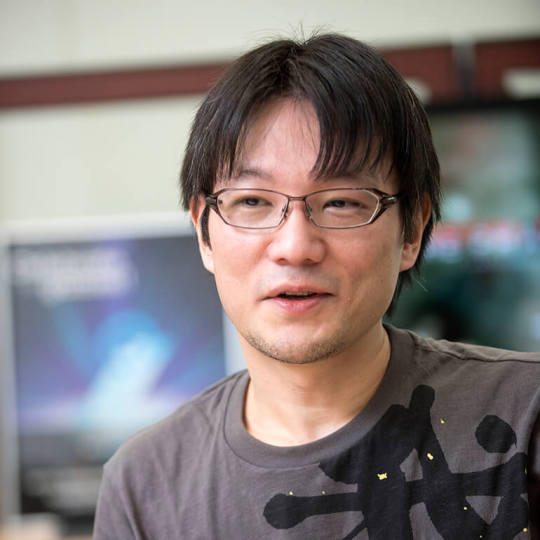
Noriaki Yamamoto - Graduated from the Department of Mechanical Engineering in the Tokyo University of Science in 1997. Joined the Konami School in 1999. He was involved with the Castlevania series, creating pixel art for characters, weapons and icons, up until Castlevania: Order of Ecclessia (2008). He was involved in the modelling and designing of weapons and mecha in titles such as Neo Contra (2004), Metal Gear Solid V: Ground Zeroes (2014), Metal Gear Solid V: The Phantom Pain (2015) and Metal Gear Survive (2018).

Konami Digital Entertainment - The digital entertainment subsidiary of Konami Holdings (itself, originally established in 1973 as Konami Industry) which branched off in 2006. They are involved in the planning, production, manufacturing and sales of console games, mobile games and card games. Currently headquartered in Minato, Tokyo.

Metal Gear Survive - The latest installment of the Metal Gear series, released on February 21, 2018. A spinoff of Metal Gear Solid V: The Phantom Pain (2015) that reconstructs it as a survival game while retaining its high sense of action. We’ll be covering the designs and modelling of the mechas and weapons that appear in the game during the latter half of this article.
Determining the Designs and Coloring of a Character
First of all, can you please tell us about your career up to this point and your current employment
Kimura: I’ve learned graphic design from the Tama Art University and then I’ve joined Konami in 1997. Since then I’ve been involved with the making of the mechs and scenery for the Metal Gear series. From Metal Gear Survive and onward I’ve been mostly in charge of project management, leaving the creative process to other people, starting with Yamamoto. My job is to support everyone else on their work.
Yamamoto: After studying mechanical engineering at the Tokyo University of Science, I studied 3D CGI and game development at the Konami School, joining the company in 1999. I was in charge of drawing pixel art for the characters, weapons and icons in the Castlevania series until 2008 and I was also in charge of designing and modelling the mecha in Neo Contra, which was released in 2004. I’ve been in charged of modelling and designing the weapons and mecha of the Metal Gear series after being assigned to the Metal Gear Solid V project. There are also many setups that I use myself. The tools that I use include Maya, SoftImage, ZBrush, Substance Painter and Photoshop.
Kimura: Since Yamamoto’s specialty is mecha, I think the content of what we will be talking will fall out of the scope of this article series. Nevertheless, Yamamoto was in charge of the modelling of Metal Gear Sahelanthropus, the leading mecha of Metal Gear Solid V: The Phantom Pain. He started with the idea of wanting to transform it. Therefore, we have many stories that could be helpful to those who want to create a robot.
We’ll look forward to it. It’s pretty unusual for an artist to had majored in mechanical engineering, but it seems to be advantageous when it comes to designing mechas. But before you tell us about Sahelanthropus, can you talk about your involvement with the Castlevania series? We would like to cover your work, from the past to the present, in chronological order.
Yamamoto: I did the pixel art for characters, weapons and icons featured in Dawn of Sorrow (2005), Portrait of Ruin (2006) and Order of Ecclesia (2008). In this case, we would designed the characters in pixel art first and then we would ask the illustrators to draw detailed designs and artwork for the characters.
You mean the pixel art was done before the official art?
Yamamoto: That’s right. Since these are video game characters, we prioritize their visibility while moving on-screen when it comes to deciding their designs and color schemes. We actually implemented the pixel art in the actual game, refining it to perfection while checking out its visibility while moving.
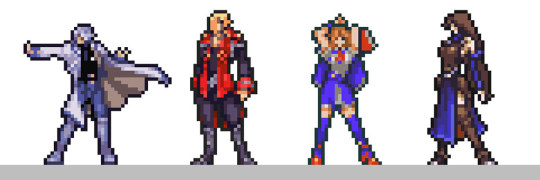
Pixel art for various Castlevania protagonists. From left to right: Soma Cruz from Dawn of Sorrow, Jonathan Morris and Charlotte Aulin from Portrait of Ruin, and Shanoa from Order of Ecclesia. Each character has a design and a color scheme that helped emphasize its visibility on-screen. In the case of Soma for example, white was chosen due to how it’s easy to view on the dark LCD screen used by the portable game machines at the time. Jonathan and Charlotte appear and fight on-screen as a pair, so they were color-coded to make them distinguishable.

Official art of the same characters from the 2010 gameCastlevania: Harmony of Despair. The official art was based on the existing pixel art.
Designing Mecha Like It’s A Toy
Can you tell us the circumstances that led you to propose a transformation gimmick to Sahelanthropus?
Yamamoto: I was assigned to the Metal Gear Rising: Revengeance (2013) project during the middle of its development. Because of that I wasn’t assigned on any of the large mechas, but I was devising mechanisms for even the smallest things with the aim of high quality. After that I was assigned to the Metal Gear Solid V project and was put in charge of modelling the Sahelanthropus, and I think that’s when the opporunity presented itself.
So the evaluation of your previous work had a great impact on your next one.
Yamamoto: Not only that, but it also helped in clarifying what I like to work on everyday. If you keep going on and on, you will eventually find work that you will want to do. I think everyone likes to leave the most important work to someone who likes it and knows it well.
Kimura: Yamamoto’s specialty is plastic models. He’s always building one. Moreover, since he majored in mechanical engineering in college, his love for mecha and engineering oozes in his work.
Yamamoto: I’ve been building models since childhood and I like transforming mecha, so I often thought about their gimmicks. When I started drawing in 3D CGI, I started making such gimmicks myself and began appreciating mecha even more. I was pretty glad when they put me in charge of Sahelanthropus. Because it was the most prominent mecha, I did my best without holding back.

Design illustration of the Sahelanthropus drawn for Metal Gear Solid V.

The 3DCGI model of the Sahelanthropus. Initially it only had the upright bipedal form on the left, but the ability to transform into the Rex-like form on the right was added thanks to Yamamoto’s proposal.
Yamamoto: Ever since I first saw the design of Sahelanthropus, I wanted it to transform into a shape similar to Metal Gear Rex (the mecha from the original Metal Gear Solid). I have a personal passion for Rex and I’m sure many fans of the series feel the same way. While Sahelanthropus was almost unchanged from its original design, we thought of adding a gimmick that allowed it to transform into Rex forum and experimented with a rough a 3D model. The transformation gimmick was well-received, so we were able to adopt it without any issue.
That specifcation change must have had a significant effect on the game.
Yamamoto: We were able to get such proposal accepted since we were involved with the Metal Gear Solid V project from the very beginning. When it gets to the stage of having to come up with the details, we designed it under the assumption that it will be turned into a toy such as a figure or a plastic model, so we make sure that the individual parts will operate without interfering with each other. As a result, the transformation can now occur within the game without the individual 3DCG parts having to overlap with each other. My experience with plastic models helped me in this regard. Because the gimmick with knee is quite complex, I thought it would’ve been impossible to reproduce without metal parts, so I was surprised when the official toy ended up using actual metal parts.
Kimura: I think it’s a great benefit to have the intuition of knowing how to adapt it into a toy. Moreover, I think it’s wonderful that we could add our own original ideas such as wanting a transformation gimmick and not just do what we’re told to do.



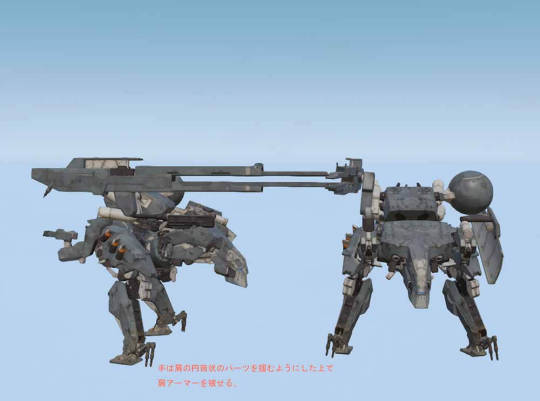
The transformation process of Sahelanthropus. “I thought a transformation might be possible if you can somehow manage with the dexterity of its upright form, but I what I actually struggled with was the transformation of its feet.” says Yamamoto. “The actual Metal Gear Rex has so-called ‘reverse joints’ for its feet and I was asked to reproduce in Sahelanthropus’ second form. But if we reproduce it too closely, we cannot used the same rig as its standard form, so we solved this issue by making the knees double-jointed.�� Kimura added “Using the same rig consistently will make it easier for the animator to work with. When making a character during game development in this matter, it is necessary to consider points such as whether the thing will collapse if another rig is added or if there will be any issue if more animation is added.”


Sahelanthropus, as it appears in the game.
Making Things Without The Knowledge
Can you tell us about other things that Mr. Yamamoto was assigned to while working on Metal Gear Solid V?
Kimura: From Metal Gear Solid V and onward, we’ve been designing all the mechas that appear in the game. Yamamoto in particular was in charge of designinf the tanks and jets, as well as modelling the Walker Gears. Although the Walker Gears are an original design, we aimed for a sense of a realism that wouldn’t make them stand out too much from real weapons, so we came up with a design that matches the historical background of the 1970′s and 1980′s by researching weapons used by actual military during that period. We followed that same process when designing the wardrobe and props used by characters. If someone without the knowledge ended up coming up with the designs, they might look cool at a glance, but they’ll lack sense of realism, so it’s not a job you could just give to anyone.
Yamamoto: Since weapons are industrial product, each part has its significance and its purpose. It’s essential for the manufacturing to have good productivity. You design while thinking whether this part will be designed by pressing, welding or minting. Good maintainability, such as whether they can be easily removed with bolts, is also important.
It seems that the setting verification and investigation during the prior stage takes a lot more work than the actual designing and modelling.
Yamamoto: The work itself is not all that time consuming. Given that we model each part one by one, research how the paint scrapes off and how it gets dirtied, and then try to reproduce that, that’s what actually takes our time. (laughs)
How long does it take to build just one mecha?
Yamamoto: It depends on the model. Some will take around two weeks, while others will take more than a month. If there are elements that affect the gameplay, then further validation and adjustments might be required. For example, if someone order us to have a vehicle that shoots long-range missiles, then a 3D model will be implemented in-game, actually move it, verify it, and make any necessary adjustments.’’

Many of the vehicles shown here were designed by Mr. Yamamoto.

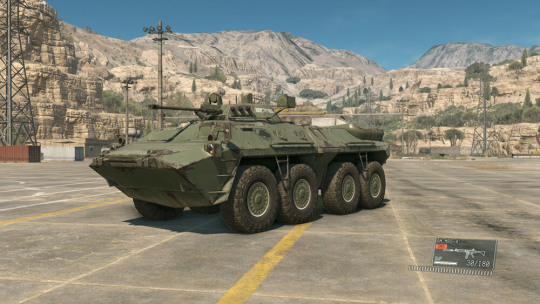
A couple of tanks designed by Mr. Yamamoto.

A fighter jet that Yamamoto was in charge of designing. “One of the methods of designing an aircraft is called the ‘area rule’.” says Mr. Yamamoto. “It states that shortening the cross-sectional area reduces air resistance. Many real-life fighter jets are designed based on this rule. By applying the same rule to the fighter jets we design for the game, our sense of realism is improved.” The jet’s design follows the area rule such as the main wings having a small fuselage in order to enlarge the cross-sectional area or shifting the position of the vertical and horizontal tails. Such attention to detail reinforces the sense of realism in the game.

D-Walker, a Walker Gear used specifically by Snake.


D-Walker, as it appears in the game.
Working With Partner Companies
What kind of work did you do in Metal Gear Survive?
Yamamoto: In addition to designing and modelling the weapons and mecha, several 3D models were also outsourced to partner companies. In past, when we outsourced some models for another project, parts of my instructions were unclear and the resulting 3D model was very different from what I’ve conceived in my mind. Based on that reflection, this time we started by making a rough 3D model, implemented into the game, and verify if it doesn’t feel out of place even while moving. After that, we create a design sketch and sent it to our partner company along with the previously-created 3D model.
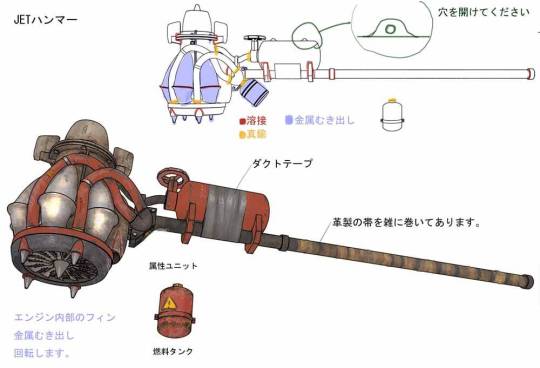
Concept drawings of the JET Hammer designed by Yamamoto. “We render the outline only as a rough 3D model and then we draw over it using Photoshop” says Yamamoto. “I was conscious of how mechanism would actually work and the realism in the composition of parts. I think we came up with a unique item thanks to that.”
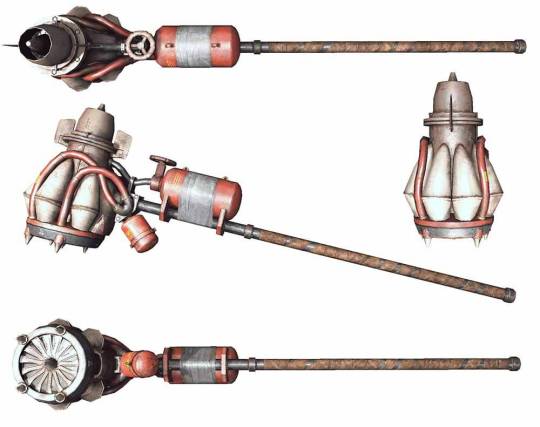
A CGI model of the JET Hammer developed by an external company based on the prior image.
Kimura: Our work is practically done when creating the design drawing. (bitter smile) I think Yamamoto’s responsibilities were pretty large, since the instructions I gave him were quite detailed. But it was because of that we’ve been able to come up with 3D models with a higher degree of perfection than ever before. Some of them were approved the first time, which was quite surprising. Prior to that, we usually redid the models at least twice.
Yamamoto: I believe our partners were able to concentrate on improving the quality thanks to the fact that they were not lost when it came to the shapes, sizes and structures. It might seem done at that point, but there’s actually a lot more work to be done afterward such as making the vertices of the polygons suitable for the game, creating various textures and adjusting the shaders.
Does the number of polygons change from the rough shape?
Yamamoto: It depends on the game’s specifications. Sometimes the number of polygons remains almost the same, but sometimes the number might increase or reduce greatly.
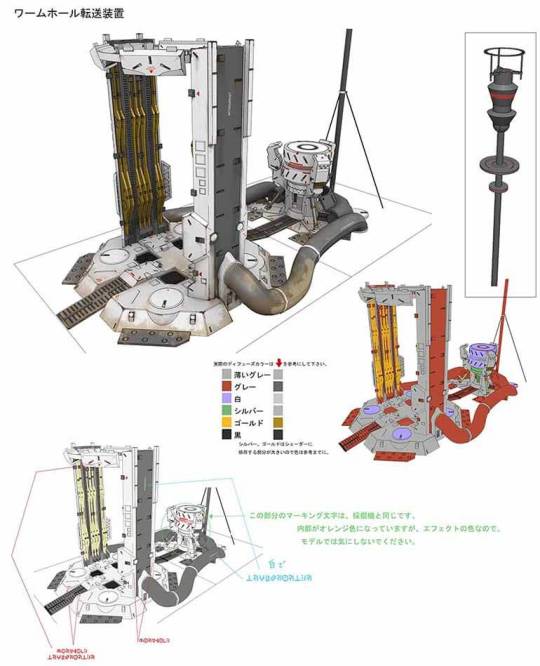
Concept art of the wormhole transporter constructed by Yamamoto. “I’ve ordered a design from somebody else, but it wouldn’t hold up together completely, so I’ve decided to redid the design myself” says Yamamoto. “The final design matches the game’s specifications, such as attaching an energy unit that shows its working status or having pole-shaped lights that can be seen from a distance.”

CGI model of the wormhole transporter outsourced to a partner company.
Kimura: While implementing a 3D model into the game, Yamamoto can talk to the directors and planners of game to find out whether it’s fun or not for the game, or whether they have a good feeling or not. I think that’s his strength.
Yamamoto: There are many things that must be said such as “I made this kind of gimmick, so this is how I want it to be used in the game”, “I want you to add this kind of sound” or “I made this kind of weapon, so I want it to be used properly.” Just passing data around will not get you everything, so we verify things after we implement it and try to explain it afterward.

The JET Hammer and the Wormhole Transporter, as they appeared in the game.
All Actions Will Change When You’re Aware of The Users
Finally, can you tell us about your future aspirations?
Yamamoto: It might be fun if I could be focus entirely on creating 3D models all the time, I can’t actually say that. In the future, I feel it might be necessary to take on a management role and bearing the burden in allowing the younger employees to nurture. You need good developers and a good team in order to make a good game. With that in mind, I’ve been mentoring rookie modellers lately.
In what order would you teach them things?
Yamamoto: First I would teach them how to use the basic tools and how we do things in our company. We cannot proceed if the basic tools are not suitable enough. There are many other things that must be taught, but the most difficulty thing that newcomers must learn is to understand a game’s specification. When it comes to game development, a modeller’s goal isn’t just to model things, but to create a game. You need to create a 3D model while considering how it will make a game fun and whether it will work without failure. If you can understand the setup, the animation and even the players themselves, everything can be changed such as how to deal with things, how you will schedule things and how you create data.

Mr. Yamamoto (left) and Mr. Kimura.
5 notes
·
View notes
Text
Biasing Tube Guitar Amplifiers
A customer, who owns a THD Flexi-50, recently asked me why our recommended bias is so much lower than the "commonly accepted 70% of maximum dissipation."
The following is my rather verbose response:
Let’s start out by stating that I am a proper amplifier designer, not a hobbyist who cuts and pastes from other designs, and gleefully repeats whatever he reads on the internet, as if it were fact. I’ve been at this for 50 years and have consulted for everyone under the sun in terms of sound, reliability, manufacturability, and just about every aspect of analog audio circuit design you can think of. I do amp repairs and restorations for dozens of multi-platinum rock bands, and I’ve often gotten that work because they see that the only amps they have that almost never need repair are their THDs. I’ve also helped Philips, Fluke and Hewlett-Packard design and build better test equipment based on my experience. I don’t even take proper textbooks as gospel, preferring to actually measure and analyze real-world situations, often proving PhD engineers and university department heads wrong in their assumptions.
Whoever started the myth that standard push-pull class AB1 guitar amplifiers (eg. Fender, Marshall, HiWatt, etc...) should be biased to 70% of maximum allowable tube dissipation should have sugar put in their gas tank. This is totally wrong in every way. There is no magic percentage of maximum dissipation to which one should bias, but most class AB1 audio amplifiers are happiest in the 35% to 40% range. (For the record, 70% is what is generally recommended for portable class B2 radio transmitters, and is close to what a class A1 amp wants.) It all depends upon the impedance of the output transformer primary, the load line of the output transformer, the impedance of the screen supply, and a few other, more esoteric factors that aren’t really worth getting into here.
People tend to repeat something that they read somewhere, as if it were truth, and it gets repeated and repeated until 95% of the hits on the internet are recommending something that was wrong to begin with. At times I find it frustrating.
That 70% factor also goes out the window when dealing with current production tubes, which are not designed to proper specs, but rather are made by reverse-engineering well-made old tubes and making countless assumptions as to why things were done the way they were. For instance, few of the Russian power tubes in production will work in a class-A amplifier. They tested their “designs” in Marshall 50-watt heads. If they worked for a few hundred hours, they gave the go-ahead to production to make 100,000 of them. Everyone who really understood how to design power tubes has been dead for 40 years, and their expertise died with them. Most people don’t spend their hard-earned money on NOS tubes because they sound better (some do, some don’t), they usually buy NOS tubes because they will sound good for 10 years of daily use as opposed to 1 year of daily use with current production stuff.
The purpose of biasing a class AB1 push-pull amplifier is to eliminate crossover distortion in the signal, plain and simple. This can be done with a distortion analyzer, but it does not differentiate crossover distortion from other types of distortion, so an oscilloscope is the best way of determining when crossover distortion has gone. When a tube is biased too cold, the signal from one tube (or tubes on one side) stops flowing before the signal from the other tube (or tubes on the other side) starts flowing, and this “gap” is called crossover distortion, as it occurs around the zero-crossing of the signal voltage. You bias a push-pull audio output section by first making it too cold on purpose, applying signal that is well below clipping, usually around 25% to 50% of clipping, and slowly increase the bias current (making the bias voltage less negative) until the gap at zero crossing is gone. When you have reached this point, you have attained the maximum dynamic range possible from the amplifier without the (very ugly-sounding) crossover distortion.
I got curious about where this point fell, as it could be a little bit ambiguous exactly where the crossover distortion “disappeared”, so I started writing down the no-signal (quiescent) dc current in the tubes where I was sure that it was gone. I documented this in roughly 10,000 amplifiers between 1969 and 1999. What I found was that, in high-powered class-AB1 amplifiers with properly designed output stages that ran their tubes near their voltage limits and had relatively linear load lines in the output transformers, the crossover distortion was sometimes gone by the time the bias was set to 21ma quiescent current per tube, often gone by 23ma, and always gone by 25ma quiescent current per tube.
One surprising thing is that it didn’t seem to matter at all what the tube type was. This number held true for 6L6, EL34, 6550, KT66, KT77, KT88, KT90, 7027A, 6CA7, 7591, 7868, USA, German, Dutch, British, French, it just didn’t seem to matter what the tube was, or who made it, as long as it was in this family of tubes that could deliver roughly 50 watts from a pair.
So, in order to make life easier for my techs, and to take some of the “guesswork” out of the biasing process, I determined that with all Marshall and HiWatt 50-watt and 100-watt amps, Fender 40, 50, 80 and 100-watt amps, and similar circuits, that they were to measure cathode current with no signal, and set the bias so that the tubes drew 25ma per tube with no signal. Then they had to do a listening test, to make sure that all was indeed well. On a few occasions the amps sounded bad at that rating, and when that happened, I took over to try to figure out why. Sometimes the two tubes were not matched, sometimes the output transformer was damaged on one side, sometimes the output transformer had been replaced with one that was not correct for the amplifier, sometimes the screen supply had too little or too much impedance. But, when things were as they should be, 25ma always gave a clean signal with no crossover distortion.
So, if your amplifier has maximum dynamic range at 25ma quiescent current per tube, what happens if you run it hotter, like 30ma or 40ma? Good question. First off, the noise floor comes up and, the tubes run physically hotter, which reduces tube life, the power and output transformers run hotter (due to the extra current running through them, even with no signal), increasing resistance in the windings, reducing overall output levels, and shortening the life of the transformers. As you can likely guess, the filter caps don’t last as long, either. I do know a few people who claim to prefer the sound of an amp biased to 40ma per tube, but these people almost always run full out, maximum distortion, 100% of the time, and never ride that expressive slope where clean gives way to “fat”, “fat” gives way to “crunch”, and “crunch” gives way to overdrive.
Another side of this is that the power supply and output stage can only deliver so much power before they just can’t deliver any more, and this is the maximum distorted full output. If you bias the output stage hotter than it needs to be, you are reducing the ratio of clean output to maximum overdrive output, and robbing the amplifier of dynamic range. Think of it like the idle in your car engine. If your engine redlines at 8000 RPM and will idle smoothly at 400 RPM, you have a ratio of 20 to 1 in terms of “dynamic range” when it comes to acceleration and general driving characteristics. You always want your idle as low as you can get it and still have it running smoothly. You can set the idle at 2000 RPM, but you will only have a dynamic range of 4 to 1, and will be shifting gears a LOT more often to get to speed. Also, you’ll be burning a lot more fuel and fixing your car a lot more often.
Biasing your amplifier to 70% of maximum plate dissipation is like setting your car’s idle to 5600 RPM with a redline of 8000 RPM. You’ll be rebuilding your engine (or replacing power tubes, filter caps and transformers) a lot more often.
I have a lot of customers who have amps worked on (under warranty) by other companies (as I only do warranty work on THD amplifiers), and then bring them to me for biasing, as everyone else seems to bias them too hot, and then their tubes don’t last very long, their amps sound overly compressed and “mushy”, and they hum too much.
It is perfectly safe for your Flexi-50 if you want to try running your bias a little bit hotter. I would not recommend going above 40ma per tube, though.
6 notes
·
View notes
Text
The Matrix (1999) Review
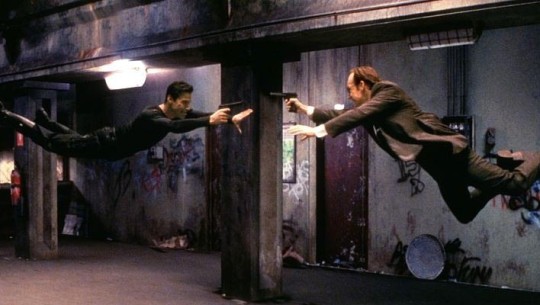
[This review includes spoilers.]
"Throughout human history, we have been dependent on machines to survive. Fate, it seems, is not without a sense of irony."
I saw this movie in the theater, with no idea what was coming. And it just blew me away.
Our hero is an everyday grunt, like most of us. Thomas A. Anderson (about as generic an American name as you can get) works in a cubicle during the day, and as a hacker who calls himself "Neo," he searches fruitlessly for the truth on his computer every night. When Neo jumps down the rabbit hole and finally "wakes up," he discovers that it is so much worse than he ever could have imagined: the real world is an environmental horror, humanity is enslaved and machines have taken over. (There are numerous clues in the opening scenes that Neo's world is unreal -- Switch even calls him "coppertop" -- but I still didn't see the reveal coming that first time.)
The existence of a savior who can work miracles and save the world injects religious mysticism into the story as a counterpoint to the all-powerful machines, who come off as demonic and evil and a lot more emotional than one might expect. (Near the end of the movie, Agent Smith acts very human with Morpheus, telling him that humans are a virus, talking about how they stink and how much he hates them.) As Neo fights the good fight and absorbs training that will allow him to manipulate reality within the Matrix, he eventually comes to believe what Morpheus tells him -- that he, Neo, is the chosen one who will free humanity. Neo's acceptance of his own reality and destiny is the key to his control of the Matrix in the final scenes on the subway platform.
Just the look of The Matrix is spectacular. Actually, of course, it's two distinct looks so that you always know where you are (a terrific visual device used recently in the series Awake). Every scene that takes place within the Matrix has a green cast with a background pattern of grids and vertical lines, accented with interesting pops of red that symbolize the imprisoned people. When we finally see the human "batteries," they are industrial towers of green with bits of red that represent the humans trapped in the pods. Some of the cinematography in this movie is just stunning -- the lines of green rain cascading down, the stream of bullet casings from the helicopter, the checkerboard floor in the stairwell, Neo and Trinity in the elevator shaft, the slomo "bullet time" scene on the roof. I have always particularly liked the sequence where our heroes are stuck inside the walls, which was filmed as if they were trapped between lines of computer code.
In contrast, when we finally see the real world, it is dominated by blues and browns, and even though there is a lot of machinery, the shapes are more organic. Morpheus and his crew wear ragged, stained clothing. It's not beautiful like the Matrix, but it's real. What fun that we get juicy red steak in the Matrix, and colorless cereal that looks like snot in the real world. Life is hard, man.
Keanu Reeves works quite well as Neo; the role is a good fit for his exceptional physical beauty and somewhat wooden acting style. Carrie-Anne Moss and Laurence Fishburne both do well as Trinity and Morpheus. For me, though, the standouts are definitely Joe Pantoliano as the despicable Cypher, Gloria Foster as the Oracle, and especially Hugo Weaving as Agent Smith. Weaving's interpretation of his character is so memorable -- the controlled gestures and precise diction with extended consonants ("... and you help your landlady carry out her garbaggggge"). Love him.
If The Matrix has a weakness (for me, anyway), it's the overemphasis on superfighting and guns. Yes, they were Hollywood game-changers and they were impressive to watch the first time, but the battles -- especially the shoot-em-up in the building lobby -- get a bit old. I think the concentration on action sequences (even bigger! even longer!) instead of on the story were what made the sequels a failure. There were a couple of logic problems, too. If the machines kept humans alive by liquifying the dead for food, why was Neo flushed but not killed? How could Neo pour machine gun fire into the room where they were holding Morpheus, and not hit him?
And of course, there's the reverse feminist journey of Trinity, who starts out as Wonder Woman in the fabulous opening sequence and ends up as Superman's girlfriend, or possibly Mary Magdalene. She even brings Neo back to life with a fairytale kiss. Oh, well.
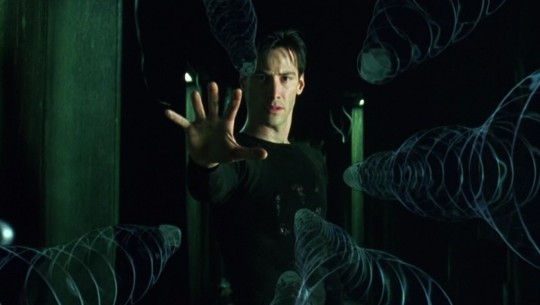
Bits:
-- The names of the characters are great fun and have meaning: Neo (Greek for "new"), Morpheus, Trinity, Cypher, Switch, Zion, and so on. Neo works at a software company called Metacortex. Morpheus's ship is called Nebuchadnezzar. Love that the two "real" brothers are called Tank and Dozer.
-- The story began and ended at "The Heart of the City" Motel. Most of the places in the movie don't have names.
-- Loved the chase through the cubicles, ending with Neo not quite able to throw himself out of a window. It's no coincidence that the agents look like FBI. Do we resent authority, perhaps?
-- I really liked that the connection to reality was an old land line telephone.
-- There are numerous references to Alice in Wonderland and the white rabbit. Neo even puts his fingers through the looking glass, and we see double reflections of Neo in Morpheus's dark glasses as well as in the spoon. In the Oracle's apartment, the movie on the TV was Night of the Lepus, the one with the killer bunnies.
-- The only colorful place in the Matrix is the Oracle's kitchen. It's still mostly green so it isn't jarring, but there is yellow and orange as well as the pops of red.
-- The guy who knocked on the door called Neo his "own personal Jesus Christ," in case we didn't realize Neo was a Christ figure.
-- It's just so much fun that deja vu is a glitch in the Matrix. What a great detail.
Quotes:
Neo: "You ever have that feeling where you're not sure if you're awake or still dreaming?" Choi: "All the time. It's called mescaline. It's the only way to fly."
Morpheus: "The pill you took is part of a trace program. It's designed to disrupt your input output carrier signal so we can pinpoint your location." Neo: "What does that mean?" Cypher: "It means fasten your seat belt Dorothy, 'cause Kansas is going bye-bye."
Cypher: "I know what you're thinking, because right now I'm thinking the same thing. Actually, I've been thinking it ever since I got here. Why oh why didn't I take the blue pill?"
Child: "Do not try and bend the spoon. That's impossible. Instead, only try to realize the truth." Neo: "What truth?" Child: "There is no spoon."
Agent Smith: "You hear that, Mister Anderson? That is the sound of inevitability."
The Matrix effectively addressed that feeling we all have at times that life is unreal and meaningless, that we're all being controlled, cogs in a machine whose purpose we don't know. The sequels may have been ultimately unsatisfying (I'm not going to review the sequels), but The Matrix deserves its reputation as an exceptional science fiction movie.
Four out of four spoons.
Billie Doux loves good television and spends way too much time writing about it.
1 note
·
View note
Photo



Grim History
Cracking the Enigma Code: The Disproven Myth of Nazi Superiority
Until the outbreak of World War II, Hitler and the Third Reich had convinced a significant part of the German people that they were a superior race, destined to conquer and control the world. The German made Enigma Machine proved to be one of the cracks that caused their whole edifice to come crumbling down.
As the level of technological sophistication grew after the Industrial Revolution, the role that computers played in warfare and espionage also took on a higher level of significance. The Nazi military leaders used the Enigma to send commands to commanders in the field. Since radio was the most efficient form of communications technology at the time, instructions were broadcast over the airwaves. The obvious problem is that radio transmissions could easily be intercepted and analyzed by enemy spies so that military maneuvers can be easily predicted. The Enigma Machine changed the whole game by encrypting information which could be decrypted by the officers who needed it. Supplied with a one time pad that was discarded and replaced on a monthly basis, codes were made clear for the possessor of this key while to an outside observer the codes were nothing but a meaningless jumble of random letters.
The Enigma Machine was invented by Arthur Scherbius; originally its purpose was for the exchange of banking and business information. As Hitler rose to power and the Third Reich began the saber rattling that signaled the coming of war, he sold them the patent to be used as a tool for the military. The Nazis naively believed their new toy created codes that were impossible for the enemy to break.
The Enigma Machine worked by sending battery-powered electrical currents through a circuit. The operator typed the code into a keyboard and each key stroke sent an electrical charge through a plug-board which was the key to the encryption; it was necessary for the sender and receiver of each command to have this part wired in exactly the same way so the encryption and decryption would be identical. With one plug out of place, the entire procedure would fail. The plug-board arrangement pattern was the key sent out to officers every month. After passing through the plug-board, the current went through three rotary scramblers which had a notch for each of the 26 letters of the alphabet. The wheels rotated to alternate letters using a polyalphabetic substitution cipher called the Vigenere Code and complicated further with a caesar shift. Each current passed through three wheels so it would be encrypted three times using a separate alphabetic cipher each time. The wheels were set so that a letter could not possibly encrypt as itself. Finally the current ended in a series of lamps with letters on them that provided the encrypted message which was then read over the radio to operators stationed far away. Thus the word “attack” might encrypt as “tygksh” and without the key, the patterning of frequencies would be too complex to be easily or quickly detected. The receiver of the command would type the message into their own Enigma Machine after wiring the plug-board according to their one time pad. The electrical currents would pass through the rotary scramblers and connect with a reflector placed at the rear of the machine; the reflector reversed the whole process and an easy to read message would be displayed on the lamps at the head of the device. The Enigma Machine was a hand-carried gadget with roughly the same dimensions as a medium-sized suitcase.
Fortunately, some Polish espionage agents were able to seize an Enigma Machine. They handed it over to the Polish secret service where a mathematician and cryptanalyst named Marian Rejewski was able to replicate the Enigma and solve the puzzle of how it worked. Building one replica-Enigma was difficult enough, but figuring out how to crack the transmitted codes was an entirely different problem. Using a polyalphabetic substitution cipher with a caesar shift meant that, although the number of possible encryptions was less than infinite, there still would be enough of them to make running each one a daunting and inefficient task that would take too long to be of use. Rejewksi came up with the idea of building multiple replicas of the Enigma and running them simultaneously until a legible code was produced. An entire room full of replicas was built by assistant engineers and a computer was used to list every possible combination of plug-board arrangements. Intercepted messages were run through the battery of machines until one produced the properly decrypted command. The replicas were called Bombs because they made bomb-like ticking noises as the rotary scramblers turned. Decrypting a ciphertext took about 24 hours.
The Polish military’s use of these Bombs worked well for a span of time. Nazi tactical maneuvers were sometimes unsuccessful but they believed this to be chance; they obviously did not know that replica Enigmas had been made as the Polish espionage agency kept this information strictly secret. Then the Nazis began adding additional rotary encryption wheels to their machines so that each Enigma had five, six, or seven scramblers instead of the older models with three. These were used more by the German navy when fighting in the Atlantic. The Polish military decided it was time to coordinate their intelligence with the British so they brought them one of their Bombs and showed them how it worked. It was taken to the highly-secretive Bletchley Park where scientists set to work on building a computer that could run more complicated ciphertexts in a shorter amount of time. Eventually they succeeded but the process took such a long time that the deciphered commands were sometimes outdated.
Then a stroke of luck occurred. A French spy who worked as a double agent for the Aixs and the Allies, not knowing what it was he had found, passed a one time pad key to the British intelligence agents. They rewired an Enigma plug-board using the key and found it worked. The British navy then set out to intercept the keys which were distributed at the beginning of every month. They raided German weather boats stationed in the Atlantic and retrieved the one time pads. They did not want the Germans to know they were raiding the ships to get the key so they bombed and sunk each one every time they finished a siege to make it look like a routine military attack. Soon the British navy, working in coordination with the American navy, were able to attack German warships and submarines before they began their operations. The Germans still did not know that the Enigma code had been cracked and they interpreted their failures as bad luck.
Of course, the Nazis eventually lost the war. The biggest weapon the Allied powers might have had was the fascists’ own hubris, the belief that their superior intelligence and military prowess made them invincible. Blinded by their own delusions of grandeur, the Germans, yet again, started and lost another war.
Singh, Simon. The Code Book: The Science of Secrecy from Ancient Egypt to Quantum Cryptography. Anchor Books, 1999.
#grim history#enigma machine#espionage#computer science#world war II#history#european history#military history
9 notes
·
View notes